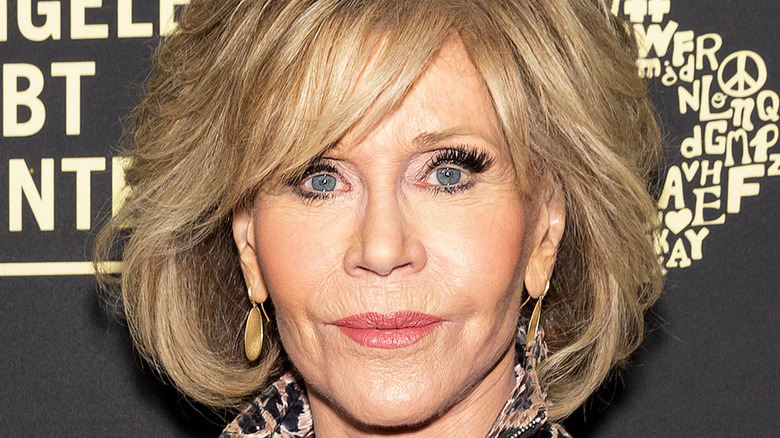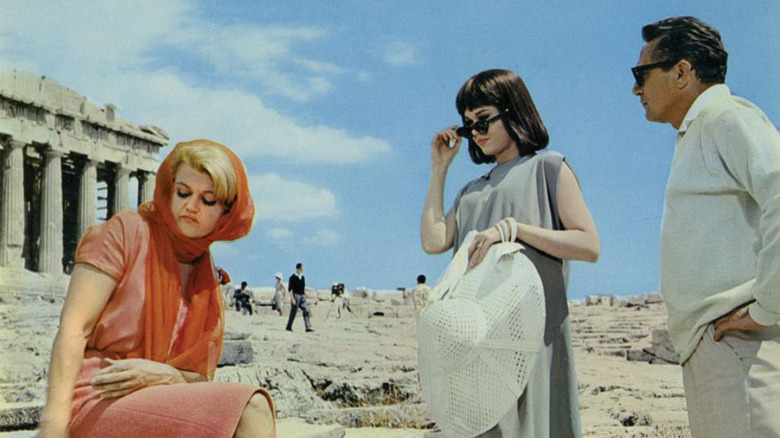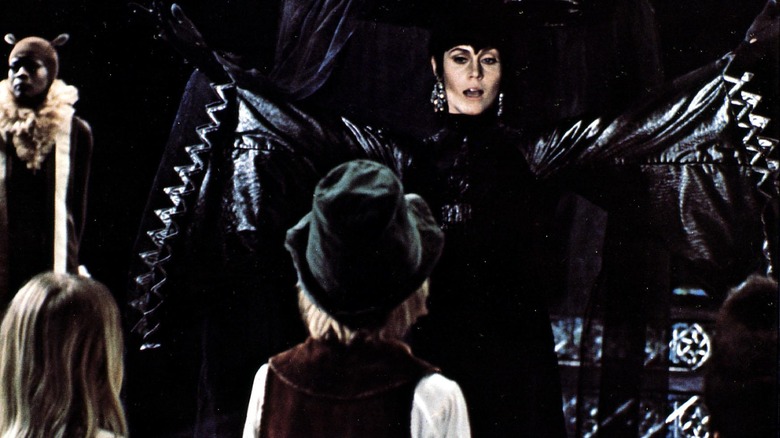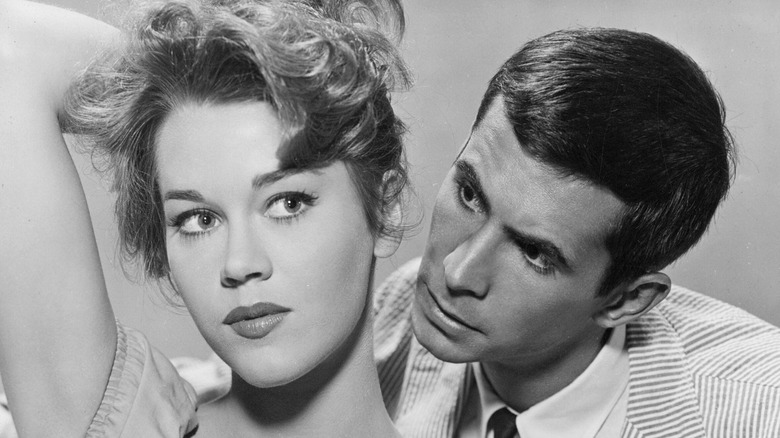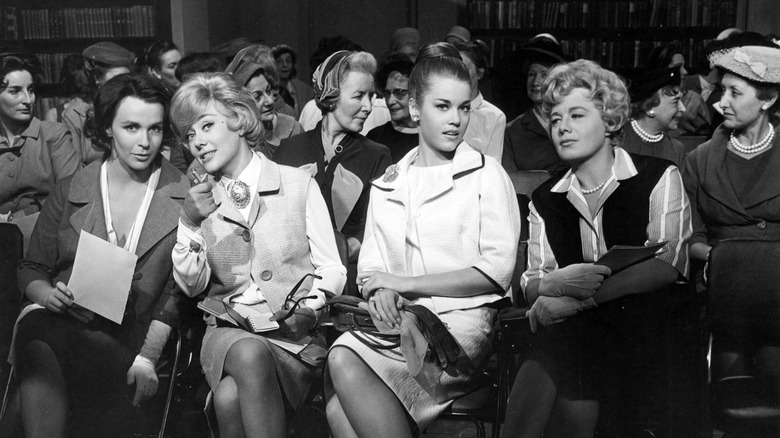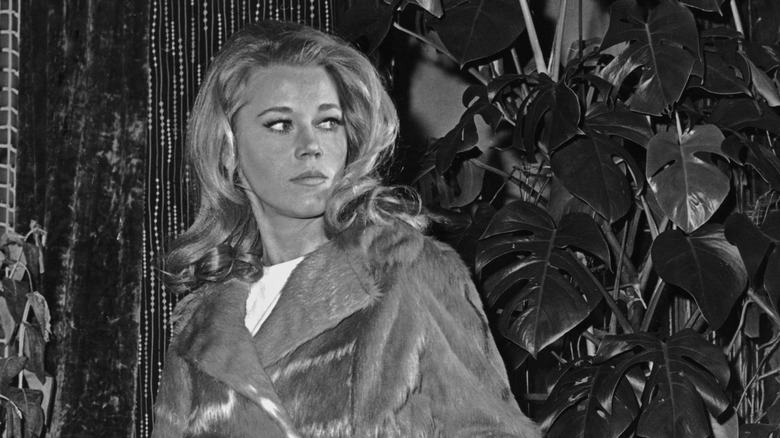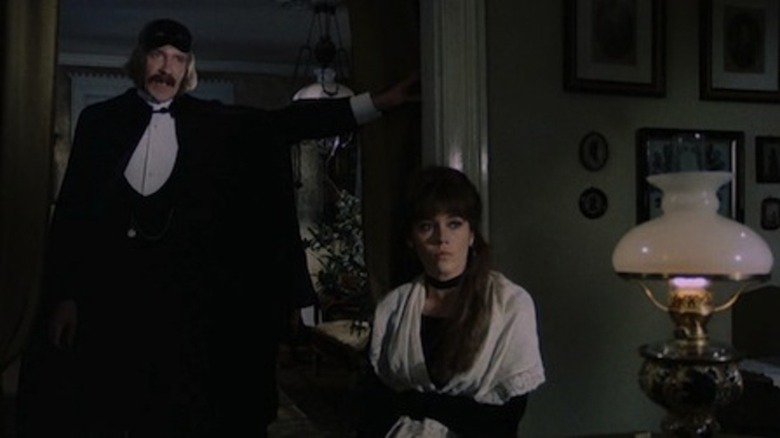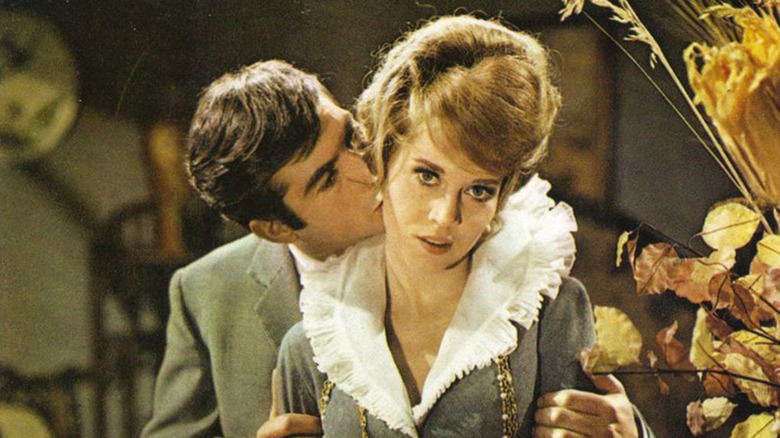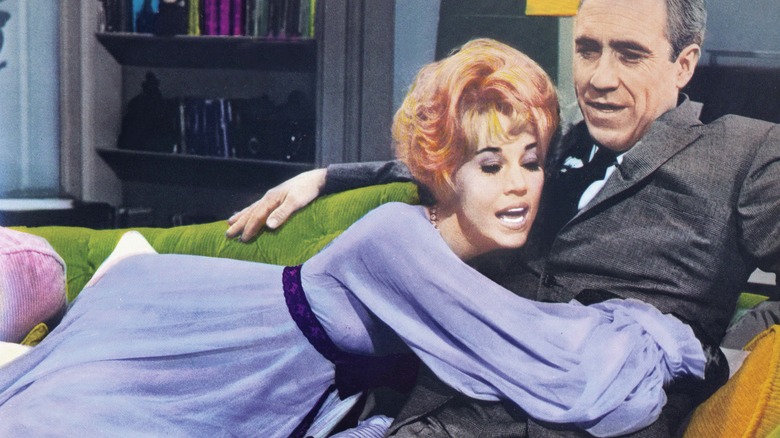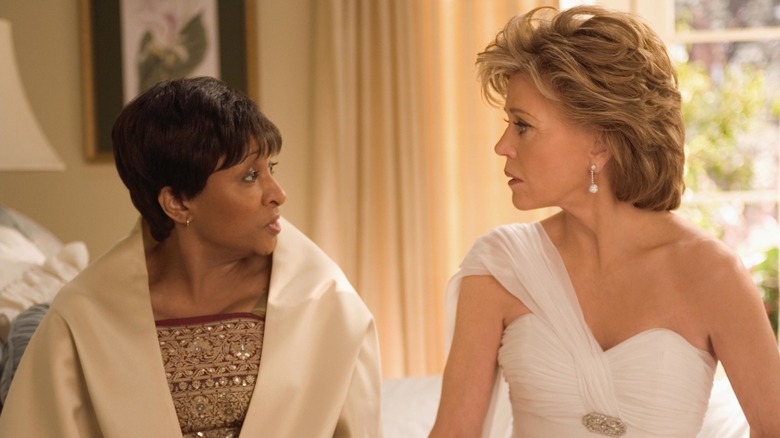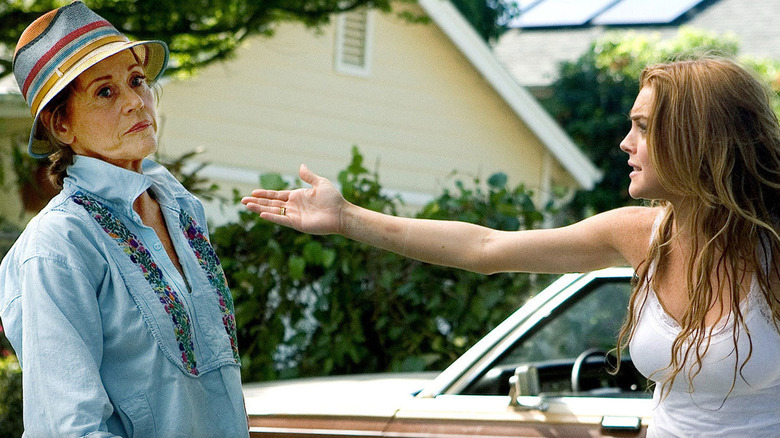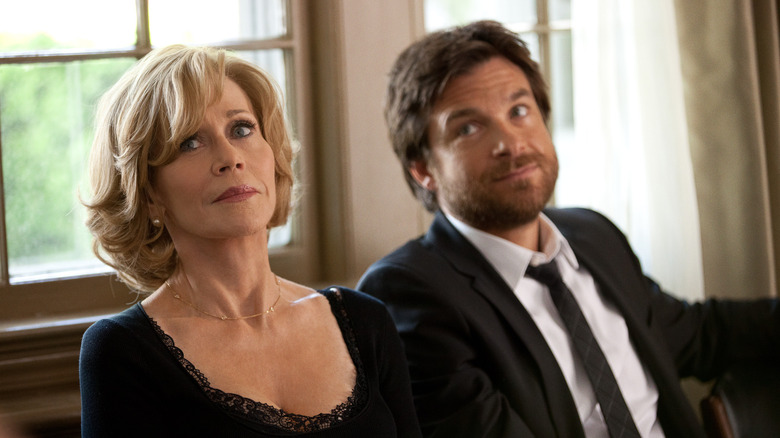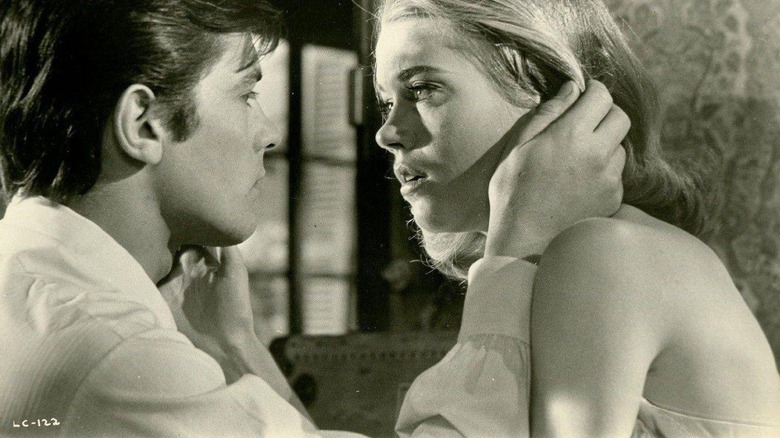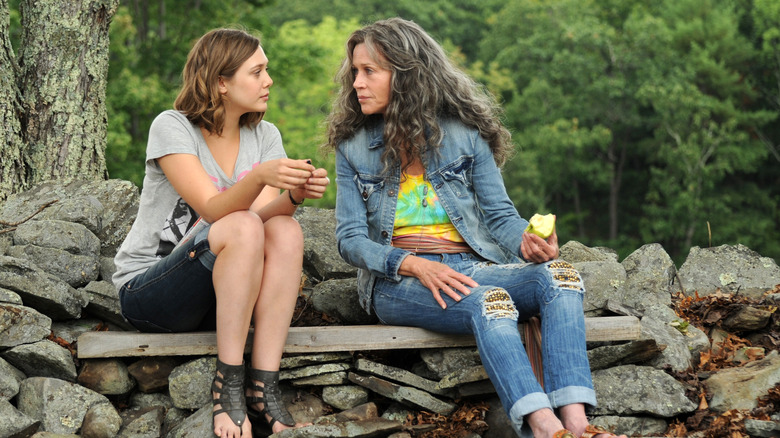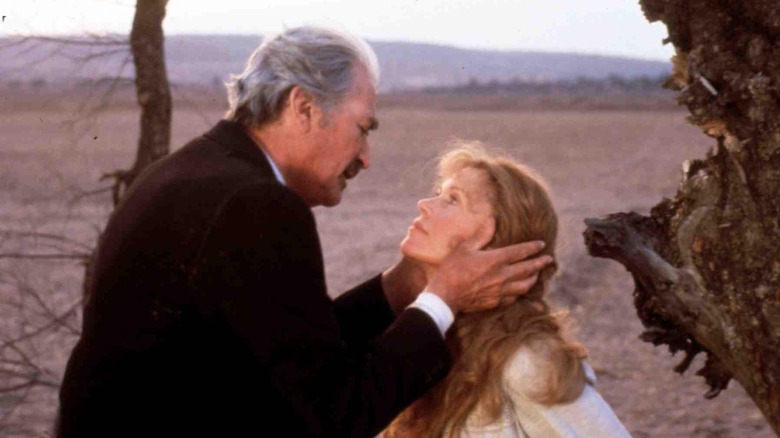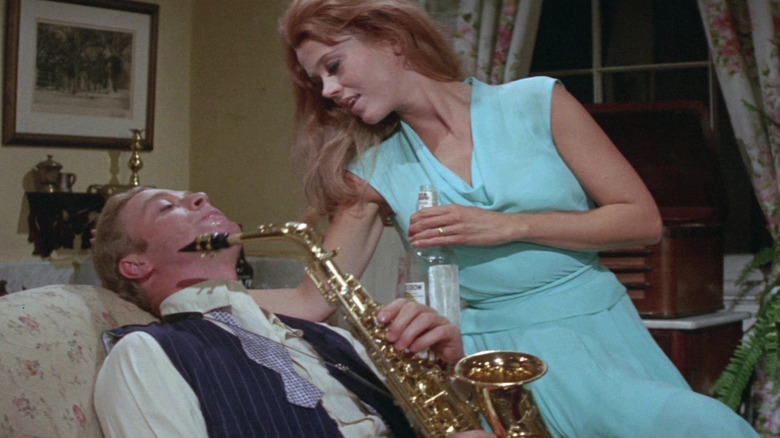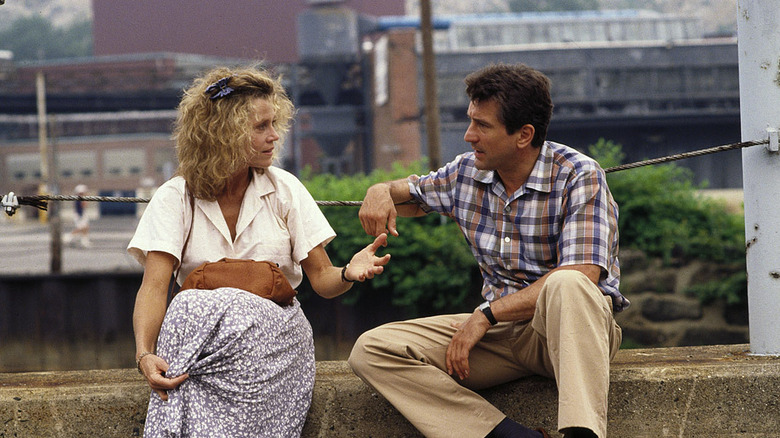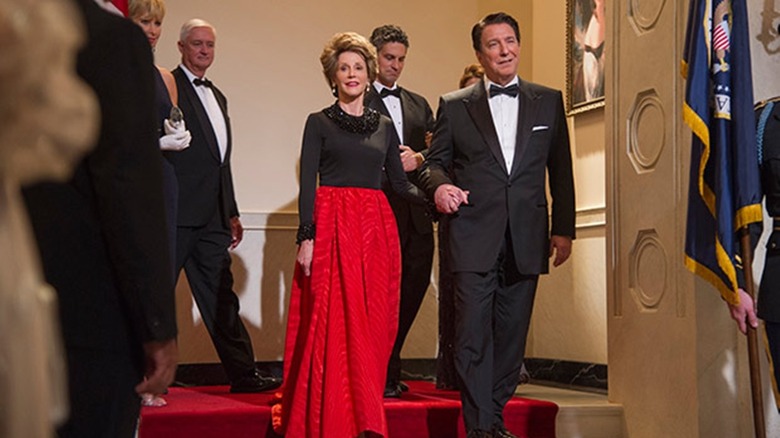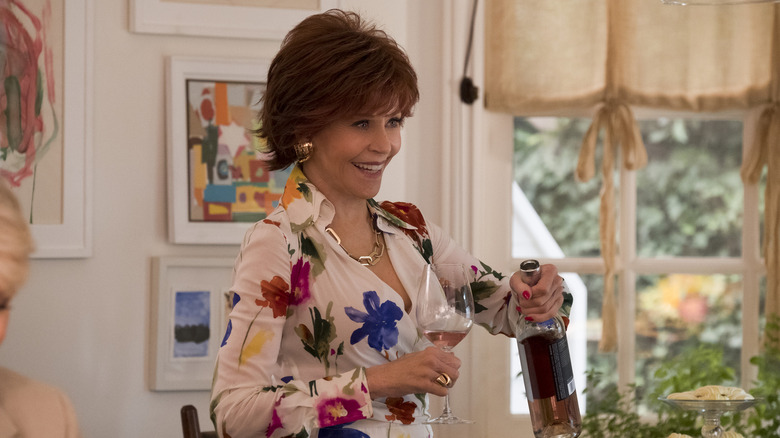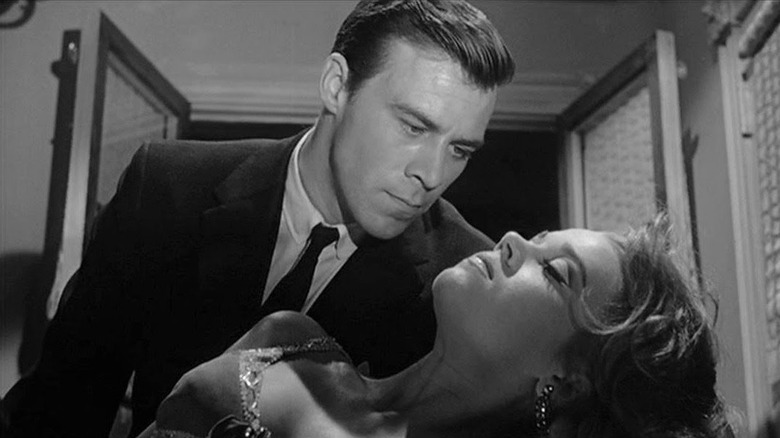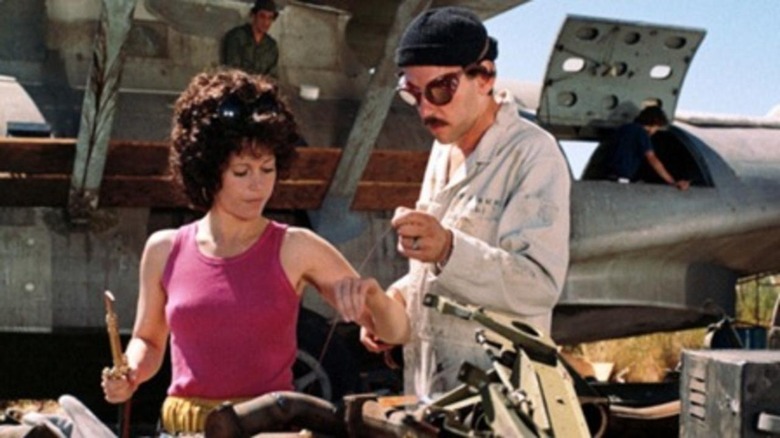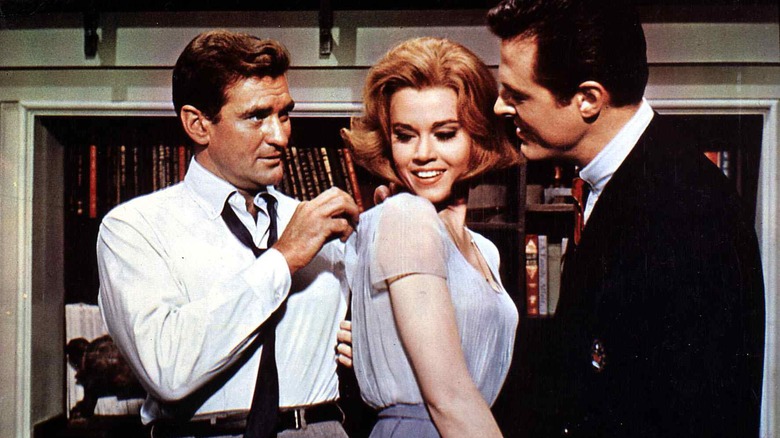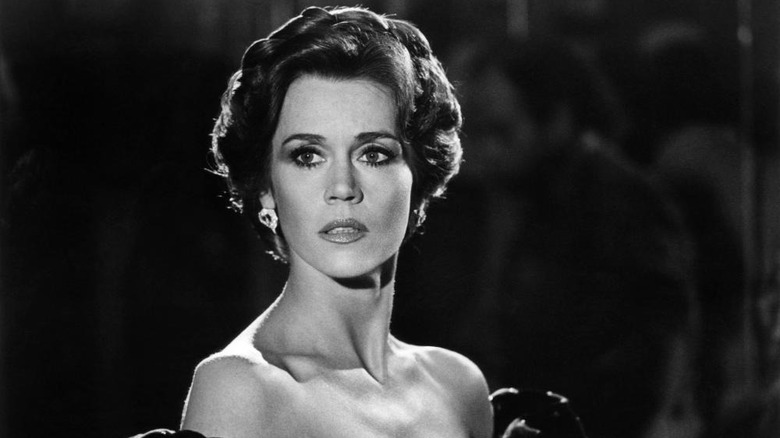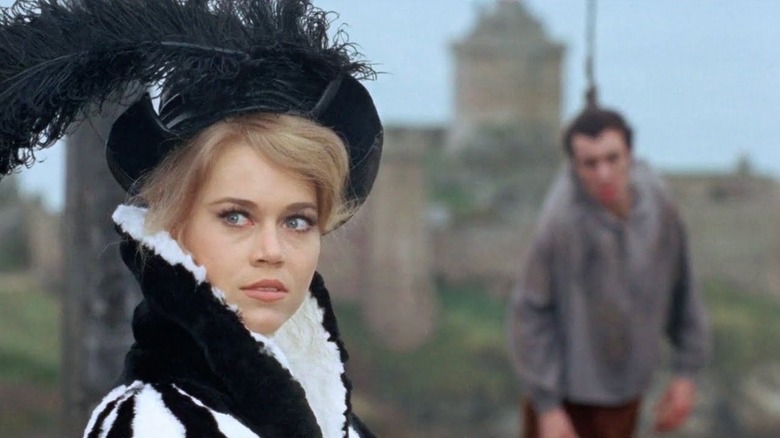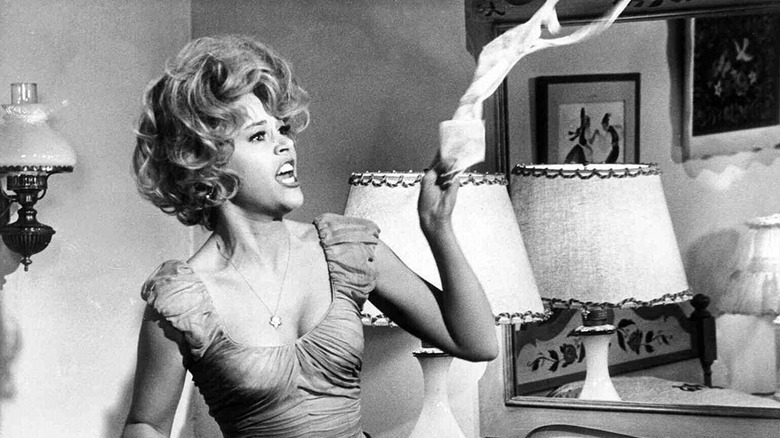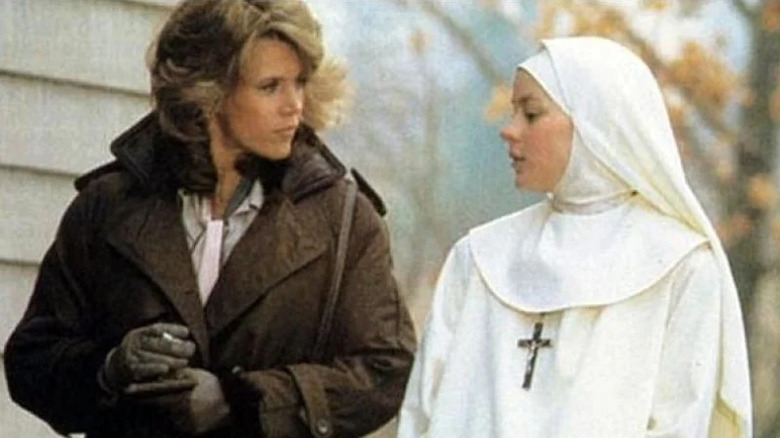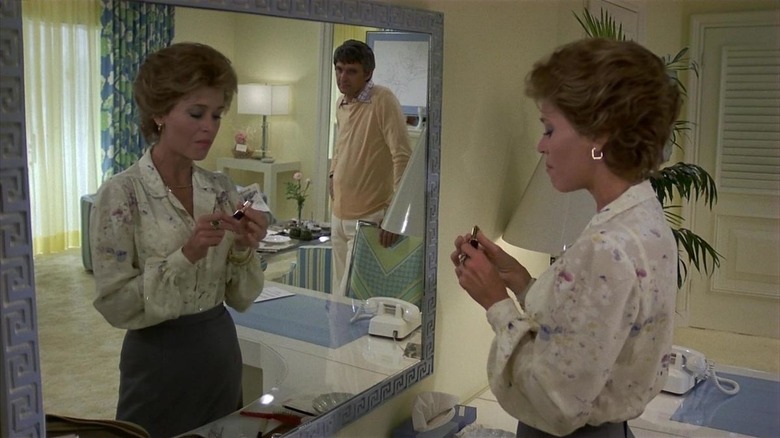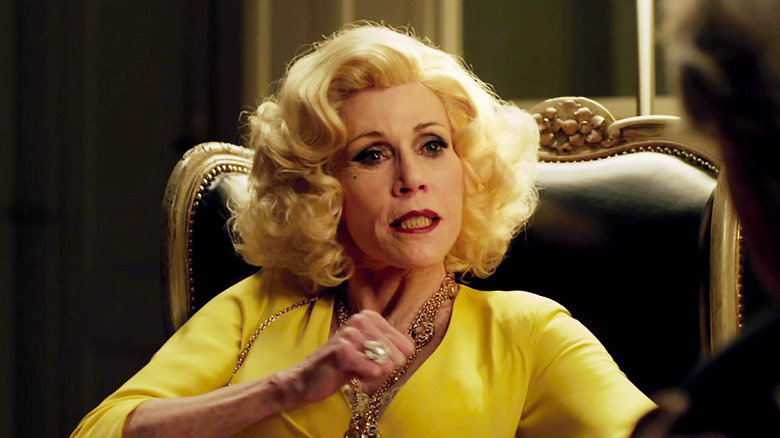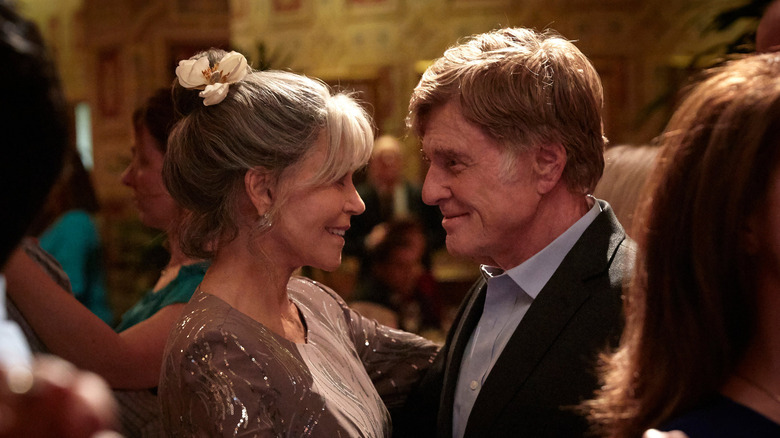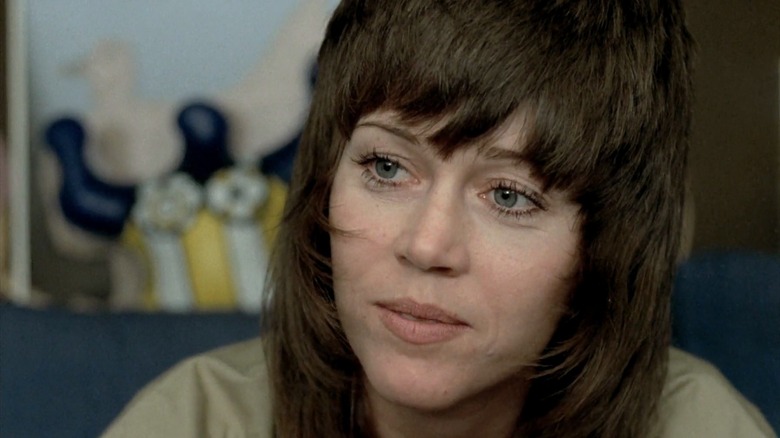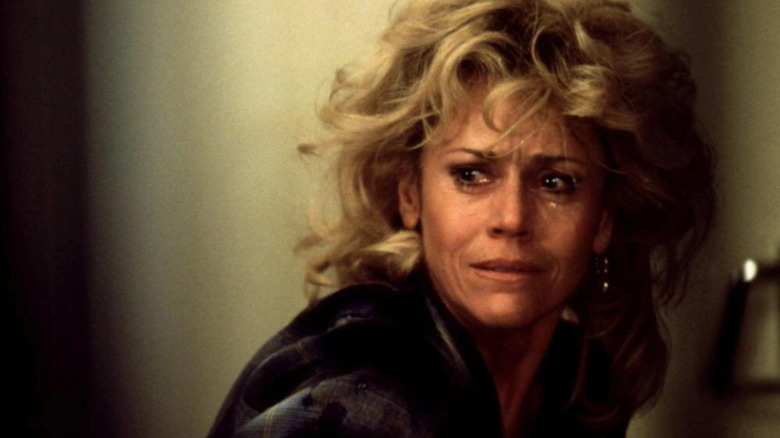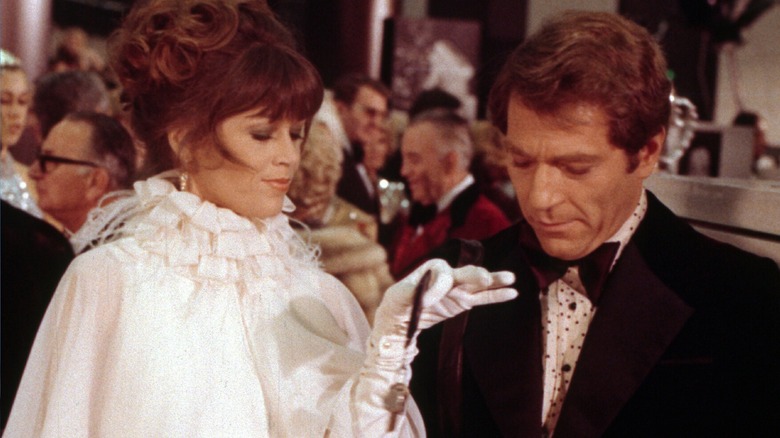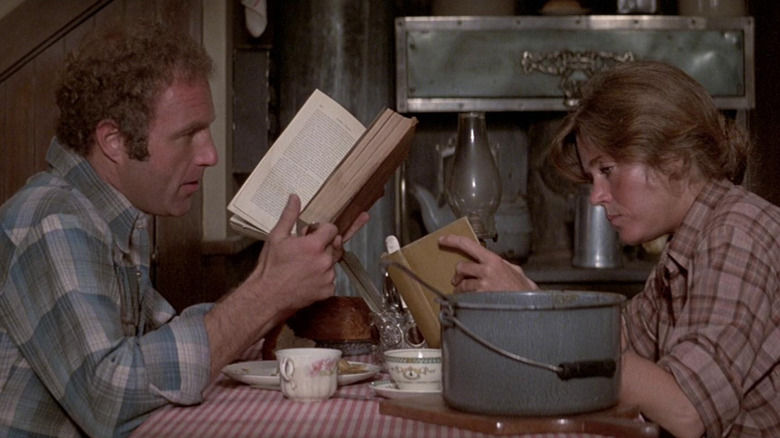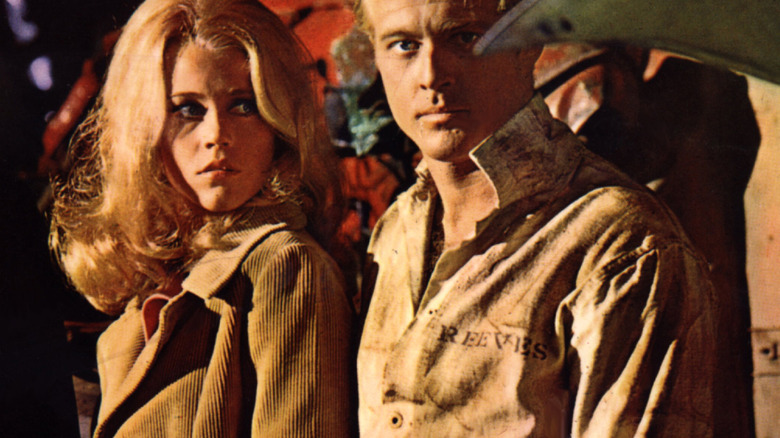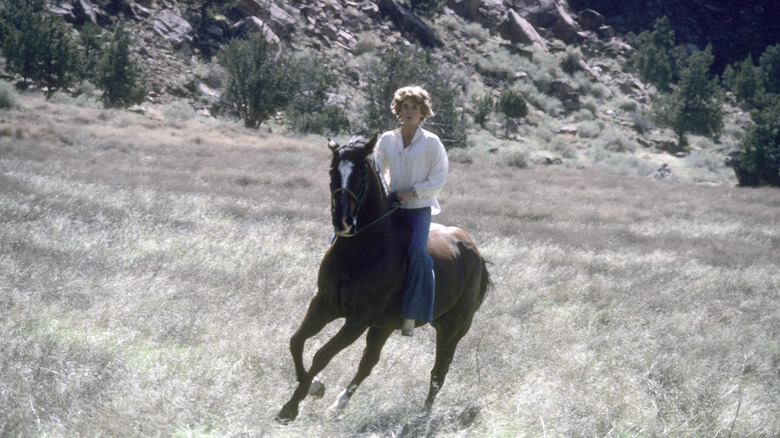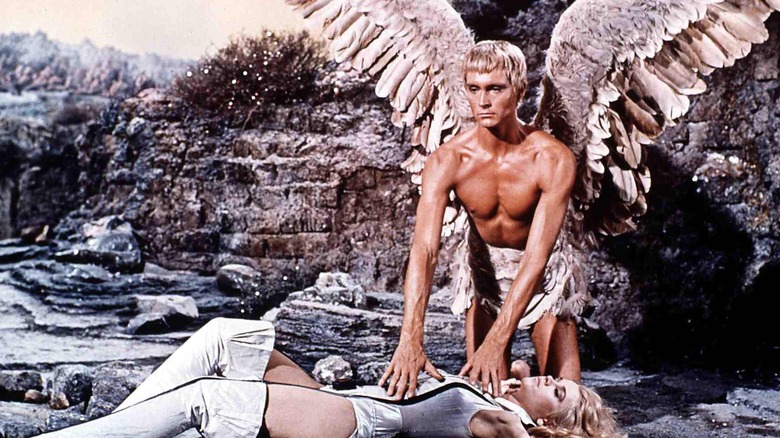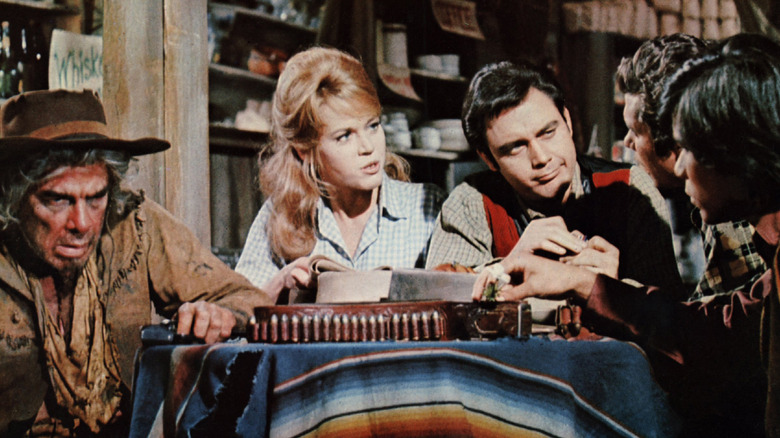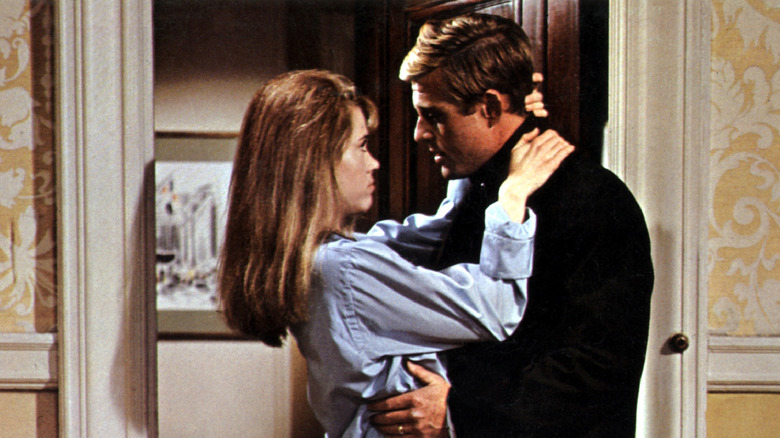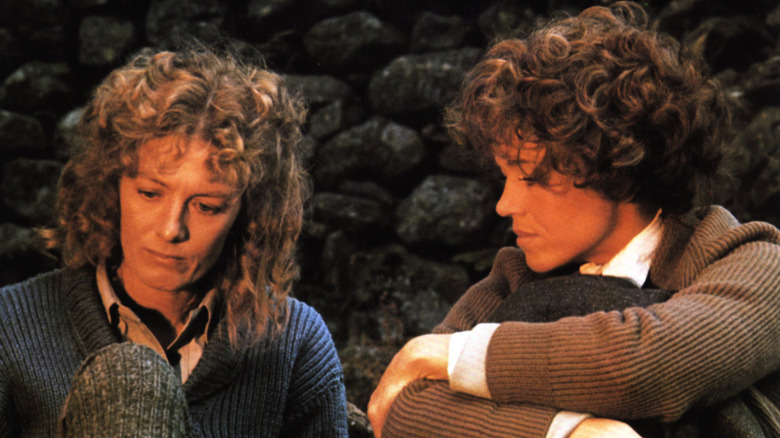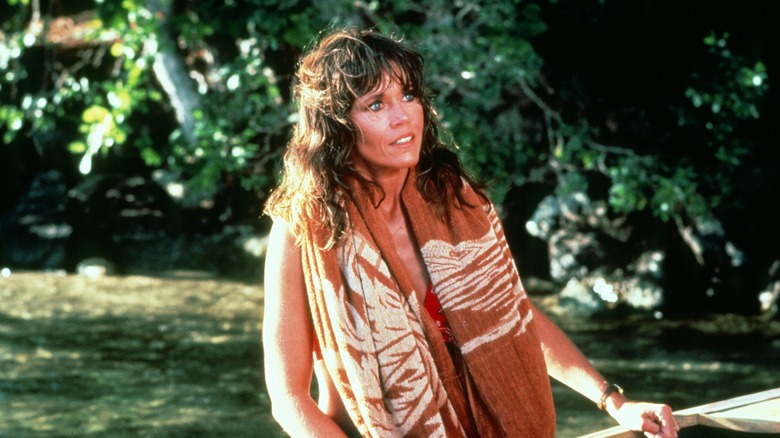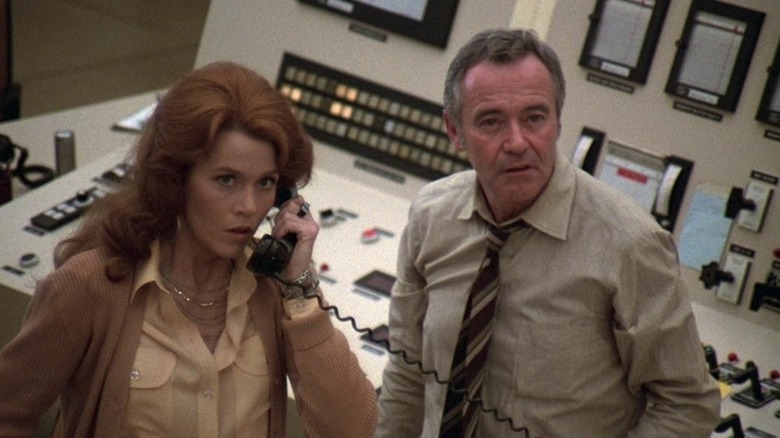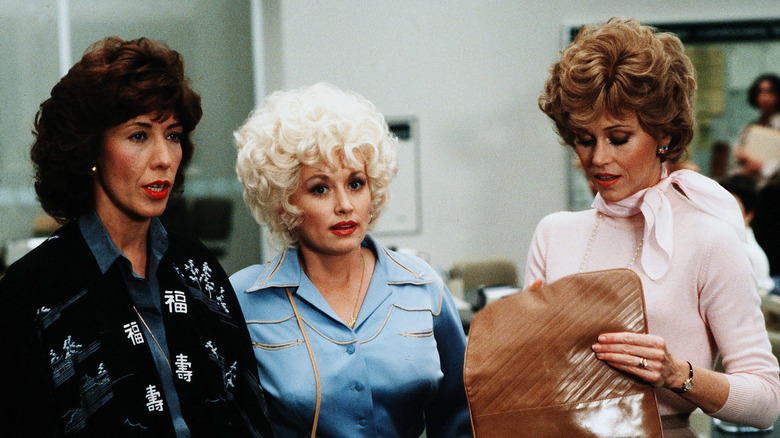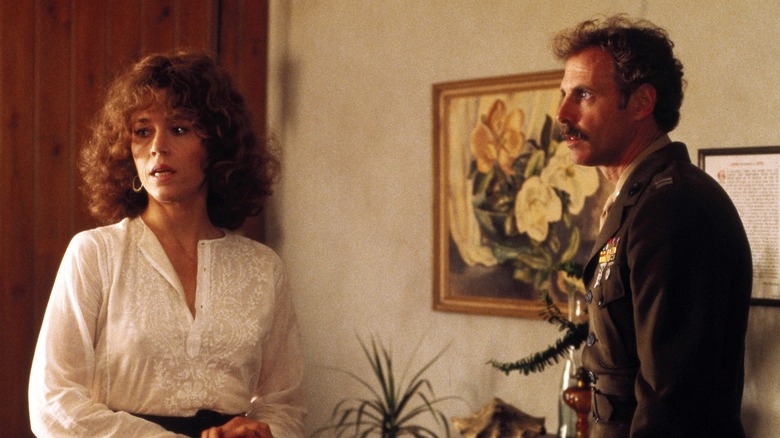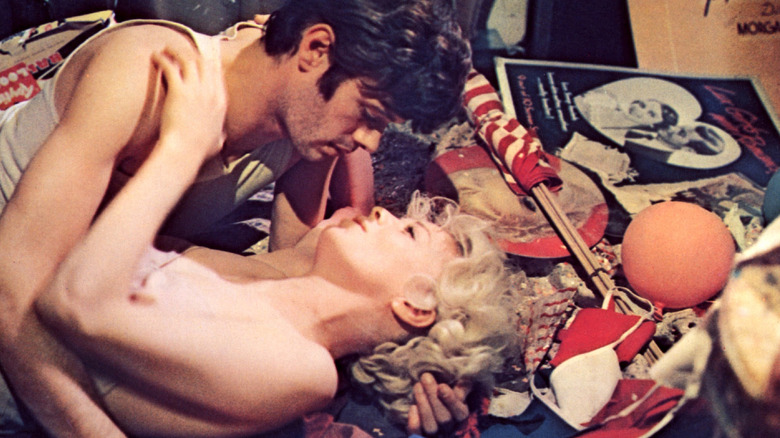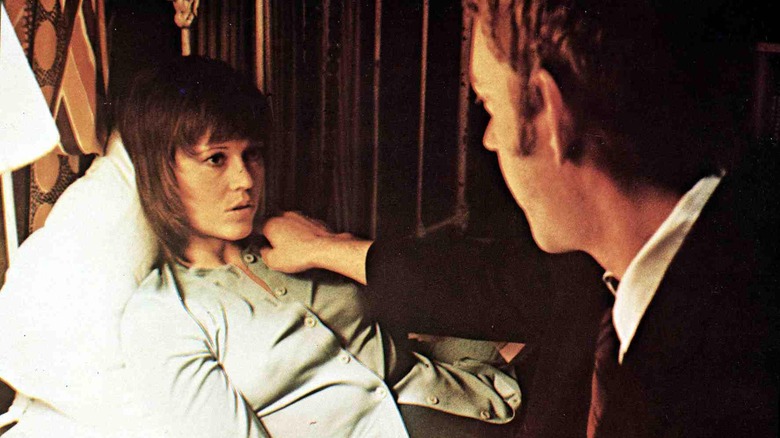Jane Fonda's Most Memorable Movie Roles Ranked Worst To Best
Jane Fonda has been known as many things throughout her life: feminist icon, anti-war activist, fitness guru. But above all else, she's been a movie star.
Born in 1937, Fonda was the child of Hollywood royalty: Her parents were Oscar-winning actor Henry Fonda and Canadian socialite Frances Ford Seymour, and her younger brother, Peter Fonda, later became an actor as well. She soon fell into the family business, breaking through with the acclaimed drama "They Shoot Horses, Don't They?" for which she earned her first Oscar nomination. She won two Academy Awards as best actress — first for "Klute," then "Coming Home" — competing additionally for "Julia," "The China Syndrome," "The Morning After," and "On Golden Pond," the only film she made with her father, Henry (who won best actor for a performance closely modeled after their often strained real-life relationship).
During this period Fonda's politics became increasingly radicalized, and her public image increasingly polarizing. A 1972 trip to Vietnam at the height of the war earned her the ire of veterans and the nickname "Hanoi Jane." In the 1980s, Fonda began producing her famous workout tapes to fund political efforts, acting in fewer films throughout the decade.
In 1991, Fonda announced her retirement from acting, but that turned out to be just a 15-year hiatus. She's since been busier than ever, most notably starring opposite her "9 to 5" costar Lily Tomlin on the comedy series "Grace and Frankie."
Let's take a look back at Fonda's greatest movies, ranked worst to best.
44. In the Cool of the Day (1963)
Appearing on an episode of "Watch What Happens Live" with her "Grace and Frankie" costar Lily Tomlin, Jane Fonda called "In the Cool of the Day" a movie that was "so bad I don't even know if it was released," and the one title she'd like to remove from her IMDb page if given the chance. And indeed, you'd be hard pressed to find anyone who's ever heard of this film, much less seen it and liked it.
Directed by Robert Stevens, it's the story of a young American couple, Christine and Sam Bonner (Fonda and Arthur Hill), who are having marital troubles. Sam is overly protective due to his wife's chronic illness, making Christine desperate for personal space. She meets and falls in love with her husband's English business partner, Murray Logan (Peter Finch), who's having issues with his own wife, Sybil (Angela Lansbury), following the death of their son. The two couples plan on vacationing in Greece together, but Sam has to stay behind due to a family illness, allowing his wife and friend's love affair to blossom while they're touring the ruins. But tragedy is lurking just around the corner.
43. The Blue Bird (1976)
"The Blue Bird" was first adapted in 1940 as a starring vehicle for Shirley Temple, and its failure almost single-handedly ended her career as a child star. This 1976 revamp, an American-Soviet coproduction, wasn't nearly as disastrous, but it is surprisingly more forgettable. Directed by George Cukor, it's the story of two peasant children, Mytyl (Patsy Kensit) and Tyltyl (Todd Lookinland), who are led on a quest for the mythical Blue Bird of Happiness by the Queen of Light (Elizabeth Taylor, who appears in several other roles). Along the way, they encounter human representations of various animals and things, including Jane Fonda as Night, the princess of darkness.
Filming in Moscow and Leningrad was plagued with problems due to the harsh climate and inedible food. Taylor ailed from amoebic dysentery throughout the shooting, while costar James Coco suffered a gall bladder attack that led to his replacement by George Cole, causing further delays. When the film finally made its way to screens, the reaction was largely negative. Writing for The Chicago Tribune, Gene Siskel said, "What a mess of a movie! You may have heard of the production problems on this $10 million fiasco filmed in Russia with an all-star cast of both Americans and Russians. Well, the problems show on the screen." Variety agreed, saying "Nobody's going to laugh in ridicule at any of it (it's that good) but nobody's going to be strongly moved (it's that bad)." (The trade did at least praise Fonda for performing her role "with a flair.")
42. Tall Story (1960)
Jane Fonda made her movie acting debut with Joshua Logan's "Tall Story," recreating the role she had played in the director's 1959 Broadway production. (Logan famously worked with Fonda's father, Henry, on both the stage and screen version of "Mister Roberts.") She plays June Ryder, a college coed who arrives at Custer University intent on studying home economics and finding a husband. She falls for honor student and basketball star Ray Blent (Anthony Perkins) and eventually gets him to marry her. But the couple needs money, and Ray is propositioned by a gambling syndicate to throw his next game. He refuses, instead trying to deliberately fail an ethics exam so he'll be forced not to play. Being the team's best player, not playing is tantamount to making them lose, thus giving the gamblers exactly what they want and making for an ethical dilemma.
While answering some of the web's most searched questions on Wired, Fonda admitted the shooting of "Tall Story" was complicated because both she and Logan were in love with Perkins. Although the film itself wasn't much to write home about, Howard Thompson of The New York Times at least found merit in Fonda's performance, saying, "The pretty newcomer shows charm and promise in her film debut." Golden Globe voters agreed, and the group awarded Fonda their most promising newcomer (female) prize.
(Special note: Look closely, and you'll see Fonda's future leading man Robert Redford as a basketball player.)
41. The Chapman Report (1962)
George Cukor's adaptation of "The Chapman Report" was intended to be a frank, probing examination of human sexuality, but there was only so much a major Hollywood film could get away with in 1962. Adapted from Irving Wallace's novel, it's based in part on the Kinsey Reports, with Andrew Duggan playing a character loosely resembling Dr. Alfred Kinsey, Dr. George Chapman. Working with his assistant (Efrem Zimbalist Jr.), Dr. Chapman surveys the sex lives of four different Los Angeles women: a housewife carrying on an affair with a young theater director (Shelley Winters), a sexually promiscuous alcoholic (Claire Bloom), a middle-aged woman lusting after a handsome surfer (Glynis Johns), and a young widow made frigid by her husband's violent aggression (Jane Fonda).
Critics poured cold water all over "The Chapman Report" when it was released, with A.H. Weiler of The New York Times saying "the steaming drama, shot in fine color with photogenic and sincere principals guided by an equally professional director, simply illustrates the truth that the boudoir sometimes is not a bower of roses and that statistics and love are not always compatible. Despite its seemingly dispassionate approach, this 'Report' is disjointed and makes little point, except the obvious." Despite its lukewarm reception, the film did manage to earn four Golden Globe nominations, including best drama film, best director, best drama actress (Johns), and best supporting actor (Harold J. Stone as Winters' husband).
40. The Game Is Over (1966)
Jane Fonda met her first husband, French director Roger Vadim, on the set of "Circle of Love," and the two were married by the time they made their second film, "The Game Is Over." A modern-day update of Emile Zola's novel "La Curee" ("The Kill"), it stars Fonda as the young wife of a wealthy French industrialist (Michel Piccoli) who begins a torrid affair with her adult stepson (Peter McEnery). She asks her husband for a divorce, and he agrees on the condition that she gift him her vast inheritance so he can invest it in his business.
Much like their previous collaboration, "The Game Is Over" gained notoriety for its explicit sexuality and praise for its sumptuous visuals, even if the majority of critics weren't exactly sold on the overall movie. In his two-star review, Roger Ebert called it "a tedious and ridiculous film of great physical beauty, directed with Vadim's unfailing bad taste and photographed by Claude Renoir with breathtaking virtuosity." He likened it to Vadim's early films with his ex-wife, French model Bridgette Bardot, and you can see the ways in which the director is trying to mold Fonda in that image, casting her against type in "sex kitten roles." In a 2002 Vanity Fair article, Fonda credited Vadim with having "reawakened me sexually" and breaking her from "the repressed style in which I had been raised." Although they divorced in 1973, his impact on her life and career was certainly immeasurable.
39. A Doll's House (1973)
"A Doll's House," a 1973 adaptation of Henrik Ibsen's play, had the misfortune of coming out the same year as another filmization of the exact same text. While the version starring Claire Bloom and Anthony Hopkins played in theaters and earned two BAFTA nominations, the one featuring Jane Fonda went straight to television after premiering at the New York and Cannes Film Festivals. It wasn't until 1980 that it received a limited theatrical run in Los Angeles, after which it largely disappeared.
In the film, Fonda plays Nora Helmer, who lives a quiet life with her husband, banker Torvald (David Warner), and their children in a 19th-century Norwegian town. Torvald dominates the household, often criticizing Nora for being childish and patronizingly referring to her as his "doll." What he doesn't know, though, is his wife has secretly been working to pay off a loan she took from his coworker, Nils Krogstad (Edward Fox), when he was sick and they were desperate for money.
The film came at a time when Fonda's political activism was often overshadowing her acting career. Rex Reed found her to be an ill fit for the role of Nora, writing, "She has poured the passion of her political and feminist beliefs into a pot too small to contain them... One never believes her as the macaroon-munching birdbrain or the charming coquette or the toy wife." Charles Champlin, however, found she was well suited to playwright David Mercer's adaptation, which "drops the stilted period rhetoric" of the dialogue "without going colloquial or slangy."
38. Circle of Love (1964)
Jane Fonda made four films with her former husband, French director Roger Vadim, the first of which was this controversial and ill-advised remake of Max Ophuls' classic "La Ronde." Adapted from Arthur Schnitzler's 1897 play, it's a sexual farce about various Parisians hopping in and out of bed with each other, creating a circle of love. Fonda is one link in this chain as a married woman who first makes love to a young gentleman (Jean-Claude Brialy), then sleeps with her husband (Maurice Ronet), who then takes a mistress, and on and on until the cycle is complete.
It's easy to see why Fonda, a child of Hollywood royalty who up to that time had starred in largely forgettable films, would want to shake things up by working with a provocateur like Vadim. And indeed, she caused waves by appearing unclothed in one scene, a first for an American actress in an international production. It was an occasion the studio marked with a giant billboard in Times Square of Fonda's naked backside, which she was not too pleased with.
Unfortunately, the critical reception didn't match the hype. Eugene Archer of The New York Times called it "a total debacle... a dull, pointless, ineptly acted vulgarization of a distinguished play, with nothing to recommend it beyond some attractive color photography." The film did earn a Golden Globe nomination for best foreign language film, and it ultimately did the trick of revamping Fonda's screen persona into something more dangerous and cool.
37. Any Wednesday (1966)
Jane Fonda's filmography throughout the 1960s was almost Jekyll and Hyde-esque: While overseas she was starring in "sex kitten roles" under the direction of her husband, Roger Vadim, her Hollywood productions were far safer — and often blander. "Any Wednesday" is typical of the kinds of films she starred in during that decade, a frothy romantic comedy based on a Tony-winning Broadway hit.
She plays Ellen Gordon, mistress to successful Manhattan businessman John Cleves (Jason Robards), who he keeps in an apartment on the Upper West Side. Though he spends most of his nights in New Jersey with his wife (Rosemary Murphy), Wednesdays are for Ellen. His secretary, Miss Linsley (Ann Prentiss), thinks the apartment is an "executive suite," so she mistakenly sends out-of-town client Cass Henderson (Dean Jones) to the address. Things get further complicated when a suspicious Mrs. Cleves turns up, and a comedy of errors ensues, with Ellen having to choose between the two men.
Critical reception was on the whole positive, with Richard F. Shepard of The New York Times calling it "a pleasant-enough, somewhat overdrawn film that will dispose of a few hours painlessly." Variety found it to be "an outstanding sophisticated comedy about marital infidelity," and said Fonda "comes across quite well as the girl who can't make up her mind, although she has a tendency to overplay certain bits in what might be called an exaggerated Doris Day manner." The role earned Fonda a Golden Globe nomination for best comedy/musical actress.
36. Monster-in-Law (2005)
"Monster-in-Law" marked Jane Fonda's return to the screen after a 15-year absence, although many critics wondered why she bothered to come out of retirement for it. Directed by Robert Luketic, it stars Jennifer Lopez as Charlotte, an aspiring fashion designer who falls in love with handsome doctor Kevin Fields (Michael Vartan). He pops the question, much to the ire of his domineering mother, Viola (Fonda), a newscaster who's just lost her job and is spiraling out of control. A battle of will breaks out between Charlotte and Viola, who does whatever she can to break up her son's wedding.
Critical reaction was largely negative, resulting in an 18% Rotten Tomatoes score. Roger Ebert pulled no punches in his one-star review, saying, "I hated it above all because it wasted an opportunity. You do not keep Jane Fonda offscreen for 15 years, only to bring her back as a specimen of rabid Momism." Stephanie Zacharek of Salon agreed, calling it "a mild, dull little picture that feels as if it was assembled from a kit." She was, however, happy to see Fonda return to films, calling her "a wonderful comic actress" in a "thankless" role. Despite its rancid reception, the film turned out to be a huge audience favorite, grossing $155 million on a $43 million budget. And thankfully, Fonda didn't take another long hiatus from acting after its release.
35. Georgia Rule (2007)
Jane Fonda's return to movie screens after a 15-year hiatus was certainly a momentous occasion, even if the films she initially came out of retirement for weren't exactly critical darlings. Her follow-up to "Monster-in-Law," the soapy family dramedy "Georgia Rule," centers on Rachel (Lindsay Lohan), a rebellious teenager who's feuding with her alcoholic mother, Lilly (Felicity Huffman). After Rachel gets into a car crash, Lilly takes her to live in Idaho with her domineering grandmother, Georgia (Fonda), who rules over her home with an iron fist. The trio fight, find new love, and patch up old wounds, as Rachel's incorrigible behavior is explained by a stunning revelation about her father (Cary Elwes).
Directed by Garry Marshall and scripted by Oscar-nominated "As Good as It Gets" co-writer Mark Andrus, "Georgia Rule" certainly had high hopes that were quickly dashed when critics saw it. Keith Phipps of The AV Club wrote, "director Garry Marshall has too much confidence that he can match the weighty issues here with the light comedy. He can't." He did find that of the main performances, "Fonda comes off best, even though her performance consists largely of pursing her lips in disapproval." J.R. Jones of The Chicago Reader was less kind, saying "every dramatic scene plays like one of those schmaltzy 'Happy Days' moments that inevitably drew a big 'Awwwwww!' from the studio audience." (Which is appropriate considering Marshall created "Happy Days.") It's a sentiment most reviewers shared of the film, which earned an 18% Rotten Tomatoes score.
34. This Is Where I Leave You (2014)
"This Is Where I Leave You" exists in the long tradition of family dramas where one member dies and the others gather to mourn them and rehash some old beefs. In this case, it's the patriarch who passes away, causing his four adult children (played by Jason Bateman, Tina Fey, Adam Driver, and Corey Stoll) to set aside their individual problems and return home. But their stay won't be brief, since their domineering mother (Jane Fonda) wants them to all honor their father's last wishes by sitting Shiva for seven days under the same roof. During that week, old wounds are healed, new loves are forged, and a ton of jokes are made about mom's new boob job.
The film was a change of pace for director Shawn Levy, helmer of such comedy hits as "Free Guy" and the "Night at the Museum" trilogy. Writing for RogerEbert.com, Susan Wloszczyna gave Levy props for trying his hand at "one of the more difficult genres to pull off." Though she found much to praise in the film, particularly "the presence of Jane Fonda," she ultimately hoped that the next time Levy attempted "an adult-aimed movie," he would "also try a little harder." The film earned a decidedly mixed 44% Rotten Tomatoes score and was a mild box office hit, earning $34 million domestically against a $19 million budget.
33. Joy House (1964)
"Joy House" was the first film Jane Fonda made in France, kicking off an international sojourn that would see her turning in some of her most daring work of the 1960s. Directed by Rene Clement ("Forbidden Games," "Purple Noon"), it's an ode to the dark, twisty noirs that inspired the French New Wave, centering on a dashing card sharp named Marc (Alain Delon) who's on the run from American gangsters ordered to kill him for sleeping with a New York mob boss' wife. He hides out in a mission for the poor, where he meets Barbara (Lola Albright), a wealthy widow who hires him to be her chauffeur. While working at her chateau, Marc meets her niece, Melinda (Fonda), who instantly falls in love with him. He also discovers that Barbara is hiding her criminal lover, Vincent (Andre Oumansky), who plans to kill him and use his passport to flee to South America. But there are more twists and turns yet to come.
As witnessed by its 33% Rotten Tomatoes score, the critical reaction to "Joy House" was anything but joyous. Howard Thompson of The New York Times called it "dismal claptrap" and "pure, pretentious baloney." Yet even if the film wasn't exactly well received, it at least brought Fonda to France, where she would live for several years after meeting her first husband, Roger Vadim.
32. Peace, Love, and Misunderstanding (2012)
In his mostly positive review, Roger Ebert speculated that "Peace, Love, and Misunderstanding" gave audiences a glimpse into how Fonda might spend her free time when she wasn't starring in a film, which has become infrequent in recent years. She plays Grace, an aging hippie who lives in Woodstock and behaves as though the famous music festival never ended. Her daughter, Diane (Catherine Keener), is a lawyer working in Manhattan who heads upstate to her mothers farm after her husband, Mark (Kyle MacLachlan), asks for a divorce. While there, Diane, her daughter, Zoe (Elizabeth Olsen), and her son, Jake (Nat Wolff), find love with the townsfolk and grow close with their estranged matriarch.
Ebert gave the movie one of its few favorable write-ups, calling it "an undemanding formula picture that's a lot of superficial fun and not much more." He added, "Director Bruce Beresford seems content to deliver a charming comedy and sidestep the deeper family issues that the film could have addressed." It's that superficiality and sidestepping that caused most critics to pan the film, which ended up with a 30% Rotten Tomatoes rating. Amy Biancolli of The San Francisco Chronicle was particularly harsh, writing, "The fact that Grandma is played by Jane Fonda, flouncing around in natural fabrics, should tell you something. It should tell you that there is no casting decision or character nuance or plot turn too obvious to indulge." So the good vibes didn't necessarily rub off on most reviewers, to say the least.
31. Old Gringo (1989)
Jane Fonda starred in fewer and fewer films throughout the 1980s, temporarily retiring from acting in 1990 with "Stanley & Iris." "Old Gringo" was one of only six theatrical releases she made throughout the decade, coming three years after her Oscar-nominated role in "The Morning After," so things were clearly slowing down for her. She plays Harriet Winslow, an American schoolteacher who travels to Mexico to work as a governess to a wealthy family, only to get kidnapped by General Thomas Arroyo (Jimmy Smits) at the onset of the Mexican Revolution. Along the way, she meets aging American writer Ambrose Bierce (Gregory Peck), aka "Old Gringo," who came to Mexico hoping to die but instead fell into a love triangle between him, Winslow, and Arroyo.
The film came with a high pedigree, considering it was direct by Oscar-nominated Argentinian filmmaker Luis Puenzo ("The Official Story") and based on an acclaimed novel by Carlos Fuentes. "There is a potentially wonderful story at the heart of 'Old Gringo,' but the movie never finds it," wrote Roger Ebert in his two-star review. Critics were split overall, ultimately awarding the movie a 46% rating on Rotten Tomatoes. Fonda received a Razzie nomination as worst actress for her performance — the first (and, so far, only) of her career.
30. Hurry Sundown (1967)
"Hurry Sundown" is an interesting case study in the transition from old Hollywood to new: a big studio production based on an acclaimed novel, directed by an aging auteur a decade away from retirement, and featuring a cast of up-and-coming actors who blossomed in the 1970s. In this case, the director is Otto Preminger, who courted controversy by exploring taboo subjects such as, in this case, racism.
Set in 1946, it's an epic saga about the efforts of a bigoted Southern businessman (Michael Caine) and his heiress wife (Jane Fonda) to sell their land to a northern canning plant. But the deal is complicated by two adjoining plots, one owned by Caine's cousin (John Phillip Law) and his wife (Faye Dunaway), the other by a Black farmer (Robert Hooks), neither of whom wants to sell their property. Caine pulls out all the stops to twist their arms, including enlisting the Ku Klux Klan to flood the farms by dynamiting a levee.
The film was roundly criticized for its outdated portrayal of Black characters, with Bosley Crowther of The New York Times calling it "a massive mishmash of stereotyped Southern characters and hackneyed melodramatic incidents." On the other hand, Roger Ebert thought it was "a frustrating case, not good but not particularly bad, with a smokescreen of controversy surrounding it and obscuring its real faults," which wasn't "that it's racist and tasteless, but that it's naïve and dull." Overall, the film earned a 22% Rotten Tomatoes rating.
29. Stanley & Iris (1990)
Jane Fonda temporarily retired from acting after "Stanley & Iris," and it was also the last film directed by legendary director Martin Ritt ("Hud," "Norma Rae"), who died shortly after it was released in 1990. It's the story of a grieving widow named Iris (Fonda), who lives in a sleepy New England town and goes to work at a bakery following the death of her husband. She meets Stanley (Robert De Niro), a kindly baker who comes to her rescue after a mugging. When Iris discovers Stanley is illiterate, she aims to teach him to read and write, and their love blossoms.
While this wasn't the worst reviewed film of Fonda's career, it certainly wasn't the best. Variety wrote, "The elements are in place but they don't add up to great drama in this well-meant effort to personalize the plight of illiterate people," adding, "Fonda has some trouble evoking a woman whose life would have dropped her off at such a humble station." Vincent Canby of The New York Times was more positive, saying, "It's as honest and direct and entertaining as the considerable talents of everyone involved can make it." Overall, "Stanley & Iris" received a 33% Rotten Tomatoes rating and just $5 million, making it a box office disappointment on top of a critical one. Thankfully, this didn't turn out to be the swan song Fonda initially intended it to be.
28. Lee Daniels' The Butler
Lee Daniels employs a large ensemble to document 34 years of American political history in "The Butler," and his casting of recognizable stars as former presidents drew equal amounts of praise and ridicule. Of all the performers who appear in what are essentially cameos, Jane Fonda is the closest thing to a dead ringer as former first lady Nancy Reagan. That's quite a feat, considering Fonda's personal politics couldn't be more divergent from the woman she was playing.
Loosely based on the life of Eugene Allen, the film recounts the life of Cecil Gaines (Forest Whitaker), who bears witness to history during his more than three decades working as a butler at the White House. During that time he meets and becomes friendly with several presidents, from Dwight D. Eisenhower (Robin Williams) to Ronald Reagan (Alan Rickman). During Reagan's tenure, Cecil successfully lobbies for equal pay for himself and his Black employees but becomes disheartened when he witnesses the President's refusal to support economic sanctions against apartheid in South Africa, leading to his resignation.
Fonda has a couple of scenes as Mrs. Reagan, "emblazoning her brief cameo in memory with a swing of her red-skirted hips," wrote Steven Boone for RogerEbert.com. Although her screen time amounted to a few scant minutes, the role was substantial enough to earn her a SAG nomination as part of the ensemble cast. The film itself was a surprise hit with critics and audiences, earning a 72% Rotten Tomatoes score and $176 million at the box office.
27. Book Club (2018)
"Book Club" exists as little more than an excuse to watch four veteran actresses laugh over endless glasses of wine, and sometimes that's excuse enough to exist. In this case, the four veterans are Jane Fonda and fellow 1970s stars Diane Keaton, Candice Bergen, and Mary Steenburgen, and the setup is a monthly book club in which they discuss "Fifty Shades of Grey." While reading E.L. James' famously smutty novel, the ladies are suddenly reawakened to the joys of male companionship and act upon it in different ways: Fonda's never-wed Vivian reignites her relationship with an old flame played by Don Johnson, Keaton's widowed Diane has a fling with Andy Garcia's handsome pilot, Bergen's long-divorced Sharon hooks up with Richard Dreyfuss' character, and Steenburgen's Carol falls back in love with her hubby played by Craig T. Nelson (with the help of a little viagra).
Critics were split on "Book Club," which wound up with a 54% rating on Rotten Tomatoes. On the positive side, Susan Wloszczyna of RogerEbert.com praised "Hollywood's latest bid to please the senior-discount demo with a glittering array of big screen notables of a certain age," calling it a "fairly laugh-packed comedy." On the negative side, Andrea Gronvall of The Chicago Reader slammed the "stale jokes and cringe-inducing sight gags" that "punctuate this creaky romantic comedy." The film was a hit with audiences, however, earning $68 million at the domestic box office, thus ensuring an upcoming sequel, "Book Club 2: The Next Chapter."
26. Walk on the Wild Side (1962)
Jane Fonda had an early supporting role in "Walk on the Wild Side," which caused waves for its LGBTQ undertones. Directed by old Hollywood pro Edward Dmytryk ("Crossfire," "The Caine Mutiny"), it stars Laurence Harvey as Dove Linkhorn, a lovelorn Texan wandering through the South during the Great Depression. Dove is searching for his lost love, Hallie Gerard (Capucine), and along the way, he picks up the free-spirited Kitty Twist (Fonda). He finally finds Hallie in New Orleans, where she's working in a brothel. When Dove tries to take her away, the brothel madame, Jo Courtney (Barbara Stanwyck), puts up a fight to keep her favorite employee.
Critical assessment at the time was harsh, particularly from Bosley Crowther of The New York Times, who called it "as naughty as a cornsilk cigarette." His review picked up on the subtle suggestion of a lesbian relationship between Stanwyck and Capucine, and it's that hint of LGBTQ themes that gives the film its staying power. In an essay for The Advocate, Spencer Jones wrote about how it "helped move the needle on representation" at a time when gay characters were still in the closet. "In its own small way, I think that 'Walk on the Wild Side' helped herald a more LGBTQ-friendly Hollywood," Jones surmised. "It takes advantage of the sexual permissiveness of the 1960s without going overboard, so as not to totally alienate conservative audiences."
The film earned an Oscar nomination for its original title song and retains a 60% Rotten Tomatoes score.
25. Steelyard Blues (1973)
The counterculture of the 1970s gave way to films about oddballs and misfits fighting back against society. "Steelyard Blues" is an example of this, focusing on a group of outcasts who come together to repair a dilapidated PBY airplane in the hopes of flying away to a better world. Donald Sutherland plays Jesse Veldini, an ex-con with a love for demolition derby. Into his life comes gold-hearted sex worker Iris Caine (Jane Fonda), who's brutalized by the police at the behest of the district attorney (Howard Hesseman), who also happens to be Jesse's brother. Jesse and Iris fall in love, and, after linking up with out-of-work circus performer Eagle Thornberry (Peter Boyle), decide to break into a navy yard to steal a valuable piece of equipment that will get their plane off the ground.
Vincent Canby of The New York Times called the film "an appealing movie if only because all of the people connected with it seem so utterly convinced that they are making a Third World film disguised in the shape of an eccentric caper comedy." He suspected that public knowledge of Fonda and Sutherland's "soberly humanitarian left-wing political views" lent the film "a heaviness" it wouldn't otherwise have had. "They are two performers I admire very much," he added, "but this film, which may be up to their politics, is not up to their talents. Their presence gives it more importance than the material warrants." Reviews for "Steelyard Blues" were on the whole positive, and it retains a 60% Rotten Tomatoes rating.
24. Sunday in New York (1963)
Based on its 100% Rotten Tomatoes score, "Sunday in New York" is one of Jane Fonda's best-reviewed films, yet the star herself is hardly a fan. Speaking to The Star Tribune in 2019, she admitted, "I'm surprised how many people say they love 'Sunday in New York.' Why?"
It's understandable why Fonda wouldn't be particularly proud of this movie, which came at a time when Hollywood was trying to mold her into the girl next door. Based on the play by Norman Krasna (who also adapted the screenplay), it's the story of a virginal music critic (Fonda) who breaks up with her boyfriend (Robert Culp) over his demands for pre-marital sex. She visits her brother (Cliff Robertson) at his apartment in New York City, where he assures her all good men want a woman who preserves her virtue. He then runs off for some pre-marital fun with his girlfriend (Jo Morrow) leaving his sister to wander the city on her own. While out she meets a fellow music critic visiting from Philadelphia (Rod Taylor), and the two enjoy a romantic Sunday in New York.
So yes, the movie's attitude towards female sexuality is wildly outdated, especially considering the roles Fonda would play later in her career. Yet, even contemporary critics can't help but like it. Writing for Film Frenzy, Matt Brunson called it "utterly charming in its presentation if hopelessly dated in its sexual politics." Simply put, there are worse ways to spend a Sunday than watching this film.
23. Rollover (1981)
Jane Fonda won her first Oscar for "Klute" under the direction of Alan J. Pakula, with whom she worked twice more. Their third and final collaboration, "Rollover," is an attempt at the kind of paranoid thrillers that made Pakula a famous filmmaker in the '70s (which also include "All the President's Men" and "The Parallax View"), though it never quite rises to those lustrous heights.
Fonda plays Lee Winters, who becomes the primary shareholder in a major chemical company after her husband is killed under mysterious circumstances. She seeks counsel from financier Hubbell Smith (Kris Kristofferson), and together they stumble upon a secret slush fund involving shady asset transfers that could disrupt the world economy. They also fall in love (which goes without saying).
The subject matter of "Rollover" is dense, to put it mildly, and for some, it was dealt with unsuccessfully. "The dramatic possibilities are weak at best," wrote Janet Maslin of The New York Times, "and its satirical underpinnings are nowhere to be found." She added, "The cleverness and proficiency of Mr. Pakula's other work are astonishingly absent here, as are the shrewdness of Miss Fonda's better performances and the easy-going charm of Mr. Kristofferson's." Variety agreed, calling it "a fundamentally disappointing political-romantic thriller" despite being "elegantly appointed and possessed of a provocative theme." Yet reviews were on the whole positive, and the film earned a 78% Rotten Tomatoes rating.
22. Spirits of the Dead (1968)
Italian film producer Alberto Grimaldi assembled a trio of international auteurs for his anthology film "Spirits of the Dead," which drew its influence from the spooky stories of Edgar Allen Poe. Federico Fellini, Louis Malle, and Roger Vadim each directed a segment of the triptych, with Jane Fonda appearing in the one helmed by her then-husband, Vadim.
Their segment, entitled "Metzengerstein," casts Fonda as Frederique, a young countess who inherits a vast estate and spends her days in the lap of luxury. While walking in the woods she gets caught in a trap and freed by her cousin, Baron Wilhelm (played by Fonda's younger brother, Peter Fonda), whom she had previously never met. Frederique falls in love with Wilhelm, but he rejects her, leading her to set his horse stables on fire. Wilhelm dies in the blaze, as do his prize animals, save for one black stallion who comes to haunts his cousin.
As is the case with most anthology films, opinions about each segment varied wildly. Vincent Canby of The New York Times reflected the popular critical consensus about the three: Fellini's was "marvelous: a short movie but a major one. The Vadim is as overdecorated and shrill as a drag ball, but still quite fun, and the Malle, based on one of Poe's best stories, is simply tedious." Overall, the film retains an 89% fresh Rotten Tomatoes rating.
21. Period of Adjustment (1962)
Jane Fonda earned her first Golden Globe nomination for "Period of Adjustment," an enjoyable adaptation of Tennessee Williams' play of the same name. The directorial debut of Oscar-winner George Roy Hill ("Butch Cassidy and the Sundance Kid," "The Sting") centers on two couples experiencing a... well, a period of adjustment in their relationships. Army veteran George Haverstick (Jim Hutton) falls in love with nurse Isabel (Fonda) while in the hospital and the two quickly marry after his release. But their honeymoon is anything but blissful when George can't perform in bed due to his various insecurities. They pay a visit to his old Korean War buddy Ralph Baitz (Tony Franciosa), who originally married his wife, Dorothea (Lois Nettleton), for her money and is now trying to keep her from leaving once he realizes he actually does love her.
Critics were enthusiastic about the film overall, as evidenced by its 71% Rotten Tomatoes rating. Variety called it "lower case Tennessee Williams," although that "illustrates that lower case Williams is superior to the upper case of most modern playwrights." They were less sold on Fonda, however, saying she "gives an animated performance and makes an impression, but there are times when animation lapses into over-animation, stripping the character of believability." That didn't matter to Golden Globe voters, who also nominated the film for best comedy/musical film. In addition, it also earned an Oscar nomination for its black-and-white art direction and a Writers Guild bid for best written comedy.
20. Agnes of God (1985)
Jane Fonda took a four-year gap between 1981's "On Golden Pond" and "Rollover" and 1985's "Agnes of God," as she inched closer and closer to her (temporarily) retirement. Directed by Norman Jewison, it's a prestige thriller adapted from an acclaimed play by John Pielmeier, who also wrote the screenplay. Fonda plays Dr. Martha Livingston, a psychiatrist who's investigating the mysterious death of an infant in a convent. The dead newborn was found in the room of its mother, Sister Agnes (Meg Tilly), who claims to have no memory of giving birth or even being pregnant. As Dr. Livingston tries to distinguish whether Sister Agnes is innocent or guilty of murder, she clashes with the domineering Mother Sister Ruth (Anne Bancroft), who believes the agnostic doctor should be more accepting of the possibility of miracles.
In his one-star review, Roger Ebert called "Agnes of God," "a very badly confused movie. It takes the form of a murder investigation and then uses hints of the supernatural to avoid all the hard-edged questions raised by the murder." He conceded, however, that, "Under the circumstances, the performances are as good as can be expected." Not every critic was quite as harsh, even though the film ended up with a 42% Rotten Tomatoes rating. Among its champions was Richard Corliss of Time, who said, "All three stars do smart, honorable work." Oscar voters were certainly fans, considering it earned nominations for best actress (Bancroft), best supporting actress (Tilly), and best original score.
19. California Suite (1978)
Jane Fonda enjoyed one of her earliest successes with the movie version of Neil Simon's "Barefoot in the Park," and 11 years later she starred in another big screen adaptation of the playwright's work. "California Suite" is comprised of four short stories, each focusing on the individual problems of various guests staying at a luxury hotel. In "Visitors from New York," Fonda and Alan Alda play a divorced couple fighting over custody of their daughter; in "Visitors from London," Maggie Smith plays a British actress in town with her closeted husband (Michael Caine) for the Oscars; in "Visitors from Philadelphia," a conservative businessman (Walter Matthau) must hide a comatose hooker from his wife (Elaine May); and in "Visitors from Chicago," two doctors (Richard Pryor and Bill Cosby) engage in a very competitive tennis match.
The critical consensus was split, as evidenced by the film's 50% Rotten Tomatoes score. Vincent Canby of The New York Times called it "the most agreeably realized Simon film in years." He was favorable towards the performances, saying Fonda "is superlative as the glib, semi-intellectual New Yorker whose only way of dealing with desperation is through sarcasm." Variety, meanwhile, found that it veered wildly "from poignant emotionalism to broad slapstick in sudden shifts," although the trade did praise Fonda for demonstrating "yet another aspect of her amazing range." The film was a hit at the Oscars, where it won best supporting actress for Smith (in a bit of art imitating life) and earned nominations for screenplay and art direction.
18. Youth (2015)
Jane Fonda's role in Paolo Sorrentino's "Youth" is one of those great one-scene performances where an actor shows up and steals the show through sheer force of their talent alone. Before she comes in, this is the story of two aging best friends — retired composer and conductor Fred Ballinger (Michael Caine) and movie director Mick Boyle (Harvey Keitel) — who are vacationing in the Swiss Alps. As Mick works on the script for what might be his last film, Fred receives an invitation from the queen to conduct his most famous piece, "Simple Song #3," on Prince Phillip's birthday.
Mick is writing his script for Brenda Morel (Fonda), who has starred in the majority of his previous films. The aging diva shows up at the resort and tears into her former colleague, telling him he's washed up and she's doing a TV show instead of his "cinematic bulls**t," leading to tragic consequences.
Reviews were on the whole positive, and the film received a 71% Rotten Tomatoes score. Although her role was brief, Fonda was cited by most critics as a bright spot, even if they weren't entirely sold on the movie overall. "Fasten your seat belts for Jane Fonda, who gives a seismic jolt to Paolo Sorrentino's exquisite meditation on art and aging," wrote Peter Travers of Rolling Stone. The role earned her a Golden Globe nomination for best supporting actress, although the film's only Oscar nomination came for best original song.
17. Our Souls at Night (2017)
There's something really touching about seeing Jane Fonda reunite with Robert Redford for Ritesh Batra's "Our Souls at Night," a gentle romantic drama that plays largely on our prior knowledge of the pair's previous collaborations. We saw them in their youth in "The Chase" and "Barefoot in the Park," watched them in middle age in "The Electric Horseman," and are now provided a glimpse of their twilight years with a story of two people finding love late in life. Fonda plays Addie Moore, a widow who has lived next door to widower Louis Waters (Redford) for decades without ever really getting to know him. One night the pair decides to platonically spend the night together in the hopes of abating their loneliness, and before they know it a real romance is blossoming.
In her three-star review for RogerEbert.com, Susan Wloszczyna called the film "as comforting, low-key and unfussy as your grandmother's tablecloth, the one she used every day and not just for company." She credited the screenwriting team of Scott Neustadter and Michael H. Weber, who adapted Kent Haruf's 2014 novel in much the same way they penned teenage love stories "The Spectacular Now" and "The Fault in Our Stars." She wrote, "The hormonal surges in 'Our Souls at Night' aren't quite the rollercoaster ride they are in those adolescent affairs. But this steady-as-it-goes approach to senior snuggling has its ups-and-downs too." It's a sentiment most critics shared for the film, which earned a respectable 89% rating on Rotten Tomatoes.
16. Tout Va Bien (1972)
By the time she made "Tout Va Bien" with Jean-Luc Godard, Jane Fonda had fully come into her own as a political radical, and her screen persona was finally matching her offscreen one. Co-directed by Godard's collaborator Jean-Pierre Gorin, it concerns a worker's strike at a French sausage factory and its effects on an American reporter (Fonda) and her French husband (Yves Montand), a washed-up filmmaker now reduced to directing commercials.
As is the case with most Godard films during his Revolutionary period (spurred on by the May 1968 period of civil unrest in France), the plot is secondary to the message, which in this case is criticism of capitalism. During this time, he abandoned the mainstream (albeit still unconventional) influences of his earlier work for a more alienating technique, challenging the idea of what a movie could be. These efforts were less well-received than his hits from the New Wave ("Breathless," "My Life to Live"), as evidenced by "Tout Va Bien's" 50% Rotten Tomatoes rating. In one of its better reviews, Vincent Canby of The New York Times called it "a film of true political importance, whether you believe its politics or not."
If nothing else, "Tout Va Bien" represents an important chapter in Fonda's life, as her offscreen political activism gave way to her desire to create politically conscious cinema, which includes her later triumphs "Coming Home" and "The China Syndrome," as well as the documentary "F.T.A.," which documents an anti-Vietnam War roadshow starring her and Donald Sutherland.
15. The Morning After (1986)
There's an old adage in Hollywood that one of the easiest ways to earn an Oscar nomination is playing drunk, and that certainly did the trick for Fonda in Sidney Lumet's neo-noir thriller, which brought the star her sixth bid as best actress, and her seventh nom overall. She plays Alex Sternbergen, a washed-up actress who frequently wakes up hungover. One morning, she awakens after a night of heavy drinking with no memory of the night before and no knowledge of how a dead body ended up in bed next to her. She turns to ex-cop Turner Kendall (Jeff Bridges) to help piece together the events leading up to the stranger's death, becoming increasingly estranged from her closest friends and ex-husband, hairdresser Jackie Manero (Raul Julia).
In his three-star review, Roger Ebert found that the film "never lives up to its promise — not as a thriller, anyway. The plot has some yawning gaps in it, and thriller parts should be airtight." Yet ultimately he believed it was "worth seeing anyway, because of the characters that it develops, and the performances" of Fonda and Bridges. Of the two leads, he wrote, "They feel good together, and they have some dialogue that seems more alive than most romantic talks in the movies." Critical reception for "The Morning After" was strong overall, resulting in a 63% Rotten Tomatoes rating.
14. Fun with Dick and Jane (1977)
"Fun with Dick and Jane" came at a time when Jane Fonda's offscreen activism was often overshadowing her movies. Her 1972 visit to North Vietnam, where she earned the nickname "Hanoi Jane" for an ill-fated photograph of her sitting on a Vietnamese antiaircraft gun, nearly tanked her career, even leading to the Maryland state legislature holding a hearing on potentially barring her and her films from the state. She eventually recovered her standing as a movie star, thanks in part to this audience-pleasing satire.
Directed by Ted Kotcheff, it's the story of Dick (George Segal) and Jane Harper (Fonda), a perfect American couple living a perfect American life in Los Angeles. The Harpers have everything you could possibly want until Dick unexpectedly loses his job as an aerospace engineer. Unable to find a job and sinking deeper into debt, the two are left with no better option than to turn to a life of crime, which they dive into with zeal.
Critics were decidedly mixed on the film, which earned a 54% Rotten Tomatoes score. In his two-and-a-half-star review, Roger Ebert stated it was almost like two different movies: "The first is a pleasant enough comedy with several inspired moments. The second is a truly wicked social satire that keeps trying to sneak through." Dick and Jane's turn toward crime was a "situation comedy when the movie's earlier moments seemed to be promising us a hard-boiled commentary on the recent near miss between the middle class and the recession."
13. Comes a Horseman (1978)
"Comes a Horseman" was Jane Fonda's second collaboration with director Alan J. Pakula, made seven years after their Oscar-winning triumph "Klute" in 1971, and the two films couldn't be more different. Set in the 1940s, it's the story of Ella Conners (Fonda), a young woman desperate to hold onto her family's ranch despite the encroachment of unscrupulous neighboring rancher Jacob "J.W." Ewing (Jason Robards), who tries to coerce her into selling her land to an oil company. With the help of newly arrived war veteran Frank "Buck" Athearn (James Caan) and longtime cowhand Dodger (Richard Farnsworth), Ella just might be able to fight back against the greedy oil drillers.
The production was marked by tragedy, as stuntman Jim Sheppard was killed while doubling for Robards in a scene where Ewing is dragged by a horse through a wooden gate. When the horse veered off course, Sheppard hit his head on a fence post and was airlifted to a nearby hospital, where he died shortly thereafter.
Reviews were strong overall, and the film retains a 70% rating on Rotten Tomatoes. Yet not every major critic was sold. Variety called it "so lethargic not even Jane Fonda, James Caan, and Jason Robards can bring excitement." The trade did praise Farnsworth, a former stuntman who at the age of 58 snagged his first major acting credit and earned an Oscar nomination as best supporting actor, calling Dodger "the only really good part" and "an altogether sympathetic character."
12. The Chase (1966)
In many ways, "The Chase" feels almost like a warmup for everyone involved: The year after its release, director Arthur Penn helped revolutionize American cinema with "Bonnie and Clyde," while Jane Fonda and Robert Redford enjoyed greater success starring opposite each other in "Barefoot in the Park." Yet that's an unfair assessment of this film, which has gained a cult following since it bowed in 1966.
Redford plays Charlie "Bubber" Reeves, who breaks out of prison and heads for the small Texas town of Tarl. Local businessman Val Rodgers (E.G. Marshall) wants him apprehended quickly, since his son, Jake (James Fox), is having an affair with Reeve's wife, Anna (Fonda). Sheriff Calder (Marlon Brando) is hot on the trail, but he'll have to get to Reeves before the townspeople can enact mob justice.
Penn and screenwriter Lillian Hellman make several allusions to the assassinations of President John F. Kennedy and Lee Harvey Oswald, which was not lost on critics at the time. In his review for Sight and Sound, David Wilson called the film "a comprehensive indictment of the contemporary American disease," which was (and remains) gun violence. Despite being "hysterical, extravagant, [and] preposterous," Wilson found that "The Chase" almost came together "because the actors... give grandiose performances attuned to the high pitch of the direction." Variety agreed, praising Fonda for making "the most of the biggest female role." Contemporary assessment has remained strong, and the film currently holds an 89% score on Rotten Tomatoes.
11. The Electric Horseman (1979)
It took 12 years for Jane Fonda and Robert Redford to reunite for another film following their successful Neil Simon adaptation "Barefoot in the Park." "The Electric Horseman" was also a reunion for Fonda and director Sydney Pollack, who guided her to her first Oscar nomination in 1969's "They Shoot Horses, Don't They?" Coming at the end of the 1970s, it feels almost like a farewell to the intimate, character-driven dramas that made all three famous during the decade.
Redford plays Norman "Sonny" Steele, a former champion rodeo rider now reduced to making public appearances to sell breakfast cereal. He's asked to perform with a $12 million champion racehorse at a promotional event in Las Vegas and is horrified to learn that the thoroughbred has been illegally doped and injured. Sonny rides away with the prized stallion, intent on releasing it in a remote canyon to roam with wild horses. Television reporter Hallie Martin tracks the runaways down in the hopes of cracking a good story and ends up with a romance instead.
In his three-star review, Roger Ebert called "The Electric Horseman" "the kind of movie they used to make," one that "almost willfully wants to be old-fashioned." But even though it "could have starred Tracy and Hepburn," the film does have "a bunch of contemporary themes and causes to dress up its basic situation," most notably a mistrust of corporations. The movie reaped a 64% Rotten Tomatoes score and earned an Oscar nomination for best sound.
10. Barbarella (1968)
For better or worse, "Barbarella" remains a memorable entry in Jane Fonda's filmography. The last film Fonda made with her ex-husband, Roger Vadim, it's a sci-fi romp centering on the adventures of astronaut Barbarella (Fonda), who travels through space with her blind guardian angel, Pygar (John Phillip Law). Together they search for the nefarious scientist Durand Durand (Milo O'Shea), who seeks to bring evil back to the universe with his Positronic Ray.
Whether or not "Barbarella" is a good movie is almost beside the point, considering how far its influence stretches. In a 2002 New York Times interview with the film's costume designer, Paco Rabanne, Lisa Eisner and Roman Alonso called Barbarella "the most iconic sex goddess of the '60s." In explaining his design choices for Barbarella's skin-tight wardrobe, Rabanne cited the Women's Liberation Movement, "a moment when women emerged to be warriors because they needed to affirm their desire for emancipation, freedom, and liberty. The armor was almost necessary." Modern pop stars like Lady Gaga, Katy Perry, and Ariana Grande have all put their personal mark on these designs (while New Age group Duran Duran took their name from the movie's villain).
As far as critical reception goes, the film does have better reviews than its reputation would predict, with a 74% Rotten Tomatoes score. As Marjorie Baumgarten of The Austin Chronicle perfectly summed up, it's "a camp classic" that "makes virtually no sense, but the costumes are fetishistic gems and the set design trips the light fantastic."
9. Cat Ballou (1965)
Jane Fonda's big breakthrough came with "Cat Ballou," a rambunctious comedic western, which hilariously flips the convention of the genre on its head. Directed by Elliot Silverstein, it stars Fonda as Catherine Ballou, an aspiring schoolmarm whose father is murdered by hired gun Tim Strawn (Lee Marvin) over a land dispute. When the local law enforcement refuses to arrest Strawn, Catherine becomes the outlaw "Cat" Ballou and strikes back at the greedy land developers who hired him. She forms a posse to carry out her vengeance, including bandit Clay Boone (Michael Callahan), his uncle, Jed (Dwayne Hickman), Native American Jackson Two-Bears (Tom Nardini), and gunslinger Kid Shelleen (Marvin in a double role), who sets the booze aside and gets back on his feet again. It's all set to some catchy narrative ballads sung by Nat King Cole and Stubby Kaye.
The film currently holds a 90% score on Rotten Tomatoes, although not every review was glowing. Bosley Crowther of The New York Times said it "does have flashes of good satiric wit. But, under Elliot Silverstein's direction, it is mostly just juvenile lampoon." Variety found it was "middling successful, sparked by an amusing way-out approach and some sparkling performances," including Fonda, who "delivers a lively interpretation as Cat."
"Cat Ballou" was a huge hit at the Oscars, where it won best actor for Marvin and earned nominations for its screenplay, film editing, score, and original song ("The Ballad of Cat Ballou"). Additionally, Fonda received best actress bids at the Golden Globes and the BAFTAs.
8. Barefoot in the Park (1967)
Considering how iconic an onscreen pairing they are, it's surprising how few films Jane Fonda made with Robert Redford. The best remembered of their four collaborations is most certainly "Barefoot in the Park," an adaptation of Neil Simon's hit play. Redford actually reprised his role from the original 1963 Broadway production, with Fonda taking over the role originated by Elizabeth Ashley.
The film centers on newlyweds Paul and Corie Bratter (Redford and Fonda). It's the classic Simon odd couple scenario: He's an uptight, conservative lawyer, and she's a free spirit. The two move into a new apartment in Greenwich Village, and before long Corie is trying to set their new neighbor, Victor (Charles Boyer), with her mother, Ethel (Mildred Natwick). The quartet arranges a double date, and by the end of the night, the young couple is on the brink of divorce.
Pauline Kael called the film "almost amusing in a harmlessly, pleasantly stupid way," even though, "You can still feel the stage origins of this material and the director, Gene Saks, leaves pauses for laughs that don't come." Bosley Crowther of The New York Times wrote, "If it's romantic farce you delight in — old-fashioned romantic farce loaded with incongruities and snappy verbal gags — then you should find the movie version of 'Barefoot in the Park' to your taste." Overall, it earned an 83% Rotten Tomatoes rating, as well as an Oscar nomination for Natwick as best supporting actress and a BAFTA bid for Fonda as best foreign actress.
7. Julia (1977)
Fred Zinnemann's "Julia" is better remembered for Vanessa Redgrave's controversial Oscar acceptance speech than anything else, although it's a significant entry in Jane Fonda's filmography. It's inspired by a chapter in Lillian Hellmann's memoir "Pentimento," with Fonda playing the famous playwright as a young woman struggling to find her voice, living with her mentor and lover, novelist Dashiell Hammett (Jason Robards). When she reunites in Russia with her childhood friend, Julia (Redgrave), Lillian agrees to assist the anti-Nazi movement by smuggling documents into Germany.
The veracity of Hellman's account was often called into question, with many suggesting the character of Julia was either a composite or totally made up. On a 1979 episode of "The Dick Cavett Show," author Mary McCarthy said of Hellman, "every word she writes is a lie, including 'and' and 'the.'" Hellman responded by filing a $2.2 million libel suit against McCarthy, Cavett, and the show. In 1983, the truth was further called into question when New York psychiatrist Muriel Gardener claimed to be the inspiration for Julia, although Hellman said she had never met her.
Controversies aside, "Julia" was a hit with critics, save for Roger Ebert, who called it "the story of a fascinating woman [Julia], told from the point of view of someone who hardly knew her [Hellman]." Overall it received a 74% Rotten Tomatoes score and earned 11 Oscar nominations, including best picture and best actress for Fonda. In addition to Redgrave's victory, Robards also won for best supporting actor and Alvin Sargent won for best adapted screenplay.
6. On Golden Pond (1981)
Jane Fonda purchased the rights to Ernest Thompson's play "On Golden Pond" as a starring vehicle for her father, and it's impossible not to think of their famously turbulent off-screen relationship when watching their scenes together. Henry Fonda plays Norman Thayer, a grouchy retiree spending the summer with his wife, Ethel (Katharine Hepburn), at their lakeside cottage in northern New England. Their estranged daughter, Chelsea (Jane Fonda), comes by with her fiancee, Bill (Dabney Colman), and his son, Billy (Doug McKeon), who they leave behind on their way to Europe. Before long Chelsea has returned to Golden Pond to patch things up with her dad.
Reviews were outstanding, and the film maintains a 93% Rotten Tomatoes rating. Roger Ebert said it "transcends its predictability" and "becomes a film with passages of greatness." Vincent Canby of The New York Times called the play "was processed American cheese," and while the movie still was that, the performances "add more than color to this pasteurized product. 'On Golden Pond' now has the bite of a good old cheddar."
Oscar voters showered the film with 10 nominations, including best picture and best supporting actress for Jane Fonda. It went home with three prizes: best actress for Hepburn, best adapted screenplay for Thompson, and best actor for the elder Fonda, who was too ill to attend the ceremony (he died from heart disease at the age of 77 later that year). Jane accepted the award on her father's behalf, making for an emotional acceptance speech.
5. The China Syndrome (1979)
"The China Syndrome" gained unexpected relevance by the Three Mile Island nuclear accident, which occurred less than two weeks after its release. Prior to that, the nuclear power industry had been debating the films accuracy, with former Westinghouse executive John Taylor calling it "an overall character assassination of an entire industry." As fate would have it, the fictional scenario turned out to be frighteningly close to reality.
In it, Jane Fonda plays Kimberly Wells, a news reporter who witnesses a SCRAM incident (aka an emergency core shutdown) while visiting a Los Angeles nuclear power plant. Although disaster is averted, shift supervisor Jack Godell (Jack Lemmon) suspects the plant might be in violation of several safety standards, which he tries to bring to the public's attention before a meltdown occurs. Michael Douglas, who produced the film, costars as Wells's cameraman, Richard Adams, who secretly tapes the incident.
Critics praised the film, which holds an 87% rating on Rotten Tomatoes. Roger Ebert called it "a terrific thriller that incidentally raises the most unsettling questions about how safe nuclear power plants really are. It was received in some quarters as a political film, and the people connected with it make no secret of their doubts about nuclear power. But the movie is, above all, entertainment: well-acted, well-crafted, scary as hell." Oscar voters agreed, and "The China Syndrome" earned nominations for best actress (Fonda), best actor (Lemmon), best original screenplay (co-written by director James Bridges), and best art direction-set decoration. Fonda and Lemmon also won BAFTA awards for their performances.
4. 9 to 5 (1980)
You could almost view "9 to 5" as a sort of preamble to #MeToo, since both the film and the Oscar-nominated song Dolly Parton wrote for it served as a feminist rally cry. As Parton told Elle magazine in 2019, "I think [the film] brought so much stuff to the forefront that people had not been willing to look at, even though they knew it was happening." She believes it opened "a lot of doors" and "eyes to a lot of problems that we'd been having since time began."
Parton, Jane Fonda, and Lily Tomlin play a trio of office workers constantly pestered by their boss, Franklin Hart Jr. (Dabney Coleman). Fonda is new hire Judy Bernly, a former housewife who joins the workforce after her husband leaves her; Tomlin is Violet Newstead, a whip-smart employee raising four kids on her own; and Parton is Doralee Rhodes, a married secretary who's harassed by Hart. Together, they teach the boss a lesson he won't forget.
The movie was produced through Fonda's production company, IPC Films. It was originally conceived as a drama, but as she later explained, "any way we did it, it seemed too preachy, too much of a feminist line." Since she wanted to work with Tomlin, "it suddenly occurred to [producing partner] Bruce [Gilbert] and me that we should make it a comedy." It was a good instinct, since the results earned an 81% Rotten Tomatoes rating, grossed $103 million at the box office, and inspired a long-running TV series and Broadway musical.
3. Coming Home (1978)
Throughout the 1970s, Jane Fonda produced politically conscious films, never more successfully than with "Coming Home." Directed by Hal Ashby, it centers on Sally Hyde (Fonda), whose husband, Bob (Bruce Dern), is serving in Vietnam. While her husband is away, Sally volunteers at a local veterans hospital, where she meets paralyzed and disillusioned vet Luke Martin (Jon Voight). Their friendship blossoms into romance, which becomes complicated when Bob returns home bearing psychic scars from the war.
In his review, Roger Ebert pointed out that the heart of "Coming Home," "lies with the fundamental change within Sally Hyde," who begins as "an ideal wife for a Marine" and becomes "a different person, confused in her loyalties, not sure of her beliefs, awakened to new feelings within her. She hasn't turned into a political activist or a hippie or any of those radical creatures of the late 1960s. But she is no longer going to be able to accept anything simply because her husband, or anybody else, says it's true." In this way, Sally was perhaps the most autobiographical role Fonda ever played.
The film garnered an 85% Rotten Tomatoes rating and earned eight Oscar nominations, including best picture. It won three prizes: best actress for Fonda, best actor for Voight, and best original screenplay. It lost the top prize to another Vietnam War drama released that same year, "The Deer Hunter," a movie that Fonda denounced for its depiction of the Vietnamese, adding, "Our film was better."
2. They Shoot Horses, Don't They? (1969)
"They Shoot Horses, Don't They?" represented a turning point for Jane Fonda, who up to that point had moved uneasily between frothy Hollywood romantic comedies and erotic French features directed by her ex-husband, Roger Vadim. Set during the Great Depression, it centers on several desperate people competing in a dance marathon for a $1,500 prize. Under the watchful eye of the manipulative emcee (Gig Young), the contestants try to be the last ones standing, which becomes difficult as the event wears on and they're submitted to increasingly grueling games. Fonda plays Gloria Beatty, a failed actress who views the derby as her last grasp at notoriety.
In his rave review, Roger Ebert called the film "a masterful re-creation of the marathon era for audiences that are mostly unfamiliar with it. In addition to everything else it does, 'Horses' holds our attention because it tells us something we didn't know about human nature and American society," namely that the haves (in this case the emcee and the event organizers) will subject the have-nots (the contestants) to the most demeaning indignities imaginable, all for the promise of fame and fortune. In that way, "They Shoot Horses, Don't They?" functions as an allegory for how unobtainable the American dream really is.
Critics praised the movie, which holds an 85% Rotten Tomatoes rating. It earned nine Oscar nominations, including best actress for Fonda and best director for Sydney Pollock, winning best supporting actor for Young. (Shockingly, among its nine citations wasn't one for best picture.)
1. Klute (1971)
Perhaps no other role has played better to Jane Fonda's persona than that of Bree Daniels, the high-end call girl at the center of Alan J. Pakula's paranoia-laced thriller. Bree, who caters to wealthy clients while auditioning for acting work, finds herself centered in a missing person investigation. Detective John Klute (Donald Sutherland) is hired to follow her and before long the two fall in love. But Bree discovers she's being stalked by a killer who's got his sights set on her.
In an essay penned for the film's Criterion release, Mark Harris wrote about "the importance of Fonda's contribution" in turning Bree into a modern woman. She gave input into "everything from what Bree would have on her kitchen wall (a drawing of JFK) to how she would spend her downtime (getting high, sipping wine, and reading 'Linda Goodman's Sun Signs')." Most crucially, she suggested that Bree's psychiatrist, who she opens up to about her numbness towards sex, be changed from a man to a woman. "It's Bree's intellect and edgy self-awareness that make 'Klute' such a break with previous movie treatments of prostitution," Harris wrote. In a way, that reflects the project of Fonda's life: changing the perception of women from delicate flowers to fully-empowered individuals.
"Klute" won Fonda her first Oscar as best actress and retains a 93% fresh Rotten Tomatoes score. But even without the accolades, it's earned its place in film history for how it transformed the star persona of its leading lady in ways that are reflected both onscreen and off.
